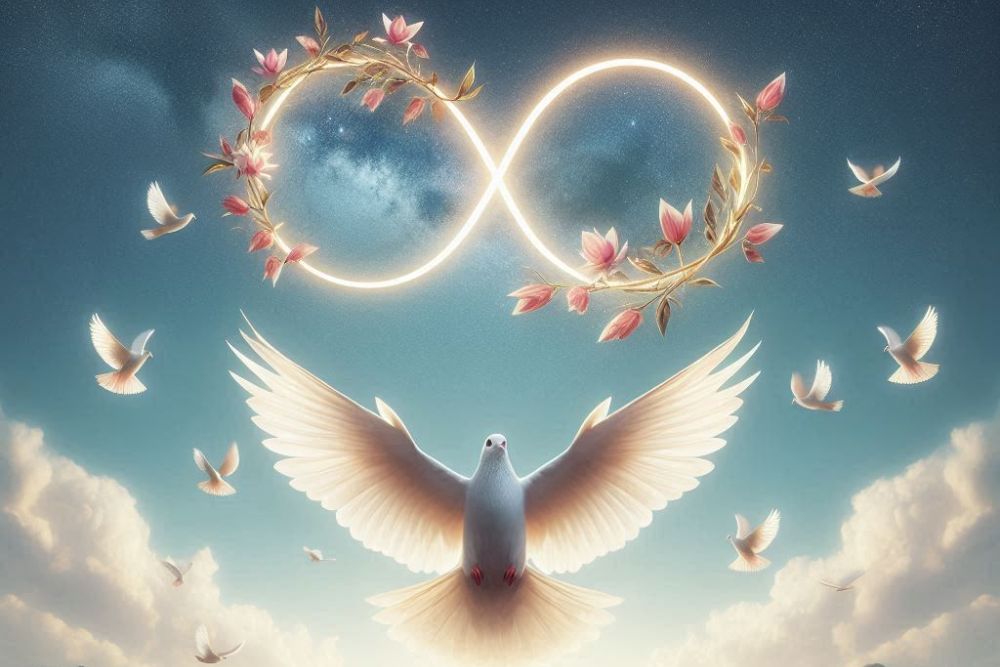Explore the transformative power of unconditional love – how it will lead one to inner peace, enlightenment, and spiritual transcendence.
What is love, truly, beyond the fleeting emotions and the confines of personal desires? Is it merely a chemical reaction, a biological imperative, or something more profound?
We experience love in countless forms: romantic, familial, platonic, and spiritual. Yet, beneath these varied expressions, there lies a universal yearning for a love that transcends expectations and limitations – often referred to as unconditional love. Whether expressed through acts of kindness, forgiveness, or simply the presence of a caring heart, it is a fundamental aspect of the human experience – a force capable of healing wounds, inspiring compassion, and connecting us to the essence of our humanity.
Highlights
- Unconditional love is a pure form of love given freely without any expectations. It is characterized by acceptance, selfless giving, consistent behavior, rejoicing in others’ happiness, and forgiveness.
- For centuries, the concept has drawn interest from countless people – including philosophers, spiritual teachers, researchers, and renowned authors. Recent scientific findings suggest that it is a biological phenomenon rooted in certain brain regions.
- Unlike other types of love, unconditional love is often seen as deeply spiritual in nature, as it transcends interpersonal boundaries and requires a connection to something greater than oneself. To fully embrace it means that one has to appreciate our shared humanity and the interconnectedness of all beings, as well as become detached from worldly standards and understand that loving others is loving oneself.
- Unconditional love is evident in countless real-life examples, from historical figures like Schweitzer and Gandhi to everyday acts of kindness. The practice of such love allows one to experience improved well-being, a better community, and a return to humanity’s core.
- The cultivation of unconditional love requires qualities such as compassion, non-attachment, patience, gratitude, responsibility, mindfulness, humility, and faith. For this purpose, one should practice mindfulness, engage in spiritual activities, invest in high-quality communication, learn to forgive, serve others, etc.
- Contrary to popular belief, unconditional love typically involves boundaries and conflicts, and it can be quite painful from time to time.
- To practice this type of love, one needs to overcome challenges such as unrealistic standards, inflated egos, excessive greed, ignorance, busyness, and a divisive mindset.
- The decision to love without limits is a personal choice; it depends on individual circumstances and values. The most important thing is to listen to one’s heart, think about one’s motivations, and intentionally reframe one’s thoughts. While it may be challenging, choosing to love unconditionally will lead to inner peace, fulfillment, and stronger relationships.
What is Unconditional Love?
Unconditional love is a type of love that is not dependent on any conditions or expectations. It is a pure and selfless form of love that is given freely, without asking for anything in return. Instead of being limited to romantic relationships, it can extend to all aspects of life, including:
- Family: Parents, siblings, children, and other close relatives.
- Friends: Loyalty and respect between friends, acquaintances, and comrades.
- All other human beings: Humanity as a whole, regardless of race, religion, nationality, or any other factor.
- Living things: Animals, plants, and other living beings.
- Spiritual things: Love for God/ the Divine, nature, or any other spiritual concept.
Examples:
- A mother’s love for her child, even when the child is rebellious or makes mistakes (e.g. indulging in drugs/ committing serious crimes).
- The bond between two friends who have been through thick and thin together.
- Two partners who are willing to accept each other’s flaws and quirks without judgment or criticism, have faith in the other’s loyalty and honesty, and offer support (emotional and practical) when necessary.
- The love of a person for their pet, regardless of the latter’s behavior.
- Acts of compassion that demand nothing in return (e.g. volunteering for a cause one believes in; helping those in distress; simple acts of kindness such as holding a door open or offering a compliment, etc.)
- One’s love for the community and their country – which is demonstrated through civic engagement, patriotism, environmental stewardship, and efforts that contribute to social justice.
- The devotion of a person to God/ the Divine, despite their personal struggles.
- etc.
| Feature | Unconditional love | Conditional love |
| Basis | Love for the inherent worth of the individual | Love based on specific conditions or expectations |
| Expectations | No expectations | Has expectations or desires something in return |
| Acceptance | Accepts the individual completely, flaws and all | Accepts the individual only when they meet certain conditions |
| Giving | Gives freely and without hesitation | Gives with the expectation of something in return |
| Focus | Focuses on the well-being of the loved one | Focuses on the needs and desires of the giver |
| Sample words |
|
|
What Does Unconditional Love Feel Like?
When you love someone, you love the person as they are, and not as you’d like them to be.
Leo Tolstoy
- Acceptance and safety
Often deemed as the purest form of love, acceptance is when one makes others feel truly seen and heard. It is about creating a safe space where people may be vulnerable and openly express their thoughts, feelings, and desires – as well as embracing them for who they are, flaws and all. Even when people share something difficult, embarrassing, or not aligned with your expectations, you are still capable of composing yourself and maintaining attention.
- No strings attached
Love is given freely, without expecting anything in return. It’s a selfless act of kindness and compassion – when one cares for others for apparently no personal gains at all.
- A behavior, not a feeling
Unconditional love is more about actions than feelings. Regardless of personal emotions, one maintains consistency in whatever they do, thereby demonstrating their commitment to others. Even times of adversity do not stop one from showing up, being present, and actively supporting the people whom they share a bond with through acts of service (e.g. cooking dinner, running errands, or offering emotional comfort, etc.).
- Rejoicing in others’ happiness
Just like a mother would do everything to keep her child happy and save him from potential pitfalls, one who loves unconditionally is devoted to the other person’s wellbeing. A good example is when one feels genuinely happy for their partner’s/ friend’s career advancement, even if it means they themselves have to make sacrifices (e.g. spending less time together). In other words, they place a strong emphasis on people’s well-being and are able to empathize with others’ accomplishments.
- Satisfaction in giving
In other words, fulfillment comes from the act of giving itself, not from what you receive in return. This is especially true for those who pursue career paths such as teaching, coaching, or mentoring; seeing their students/ fellows succeed and become a better version of themselves is a source of joy that few others can match.
- Forgiveness and understanding
People make mistakes from time to time (nobody is exempt from that); when one is capable of seeing themselves in others, they start becoming detached from grudges/ emotional burdens and willing to work together for the greater good.
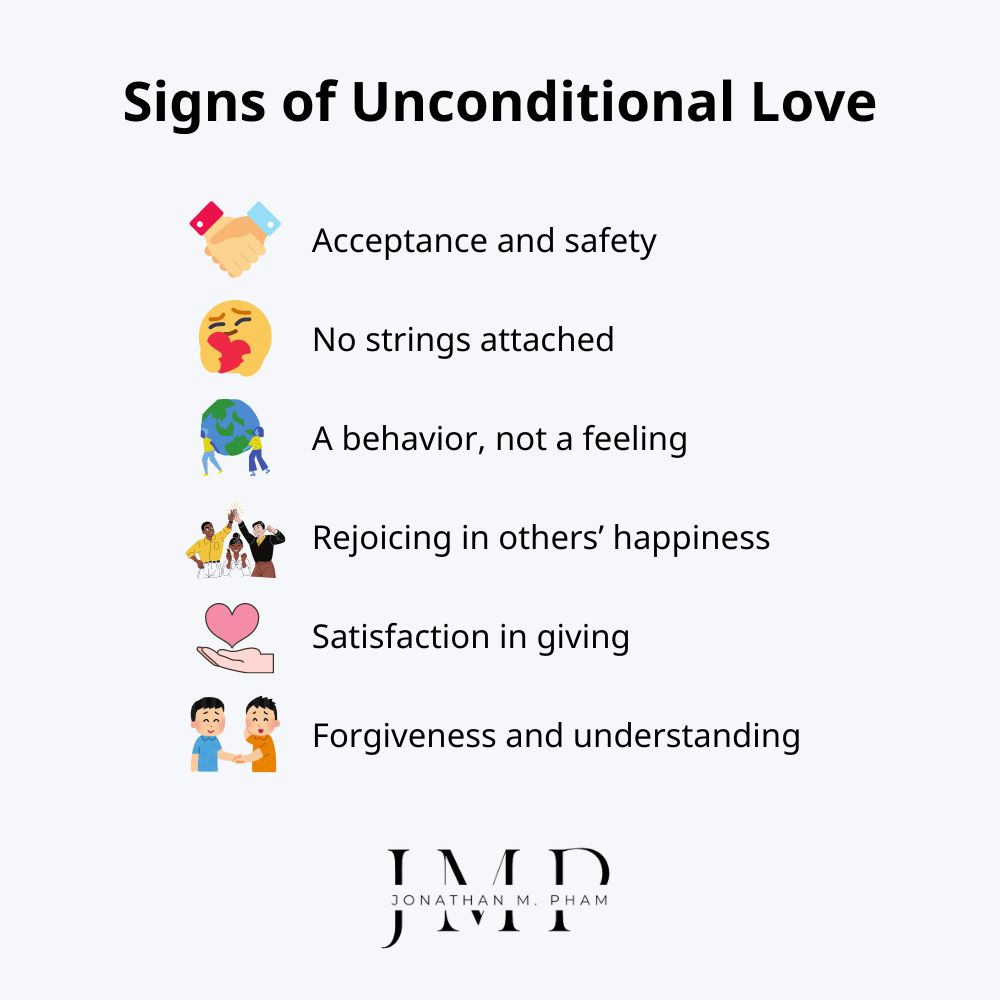
Signs of unconditional love
Types of Unconditional Love
When it comes to the subject of love, one popular framework (which was based on ancient Greek philosophical/ theological traditions and popularized by C. S. Lewis in his book “The Four Loves“) recognized four primary types, each with its own distinct characteristics:
- Eros
Also referred to as romantic or passionate love, it is characterized by physical attraction, emotional intensity, and a desire for union. Eros is associated with conditions like beauty, compatibility, mutual attraction, exclusivity, and commitment; hence, it is often seen as temporary and fleeting. Additionally, while it may be deeply fulfilling, it may create room for the darker aspects within humanity to arise – especially if one places a too strong emphasis on it.
- Storge
This is familial love, the natural affection between parents and children. It’s a love that is often unconditional, based on a deep bond of kinship and shared experiences, and is foundational for fostering a child’s emotional development and sense of security.
That being said, it is still subject to being influenced by family dynamics, expectations, and societal norms.
- Philia
Philia involves a brotherly or sisterly love – a deep affection for friends and family based on shared experiences/ values and mutual respect (e.g. the bond between siblings, close friendships, and the camaraderie among teammates). While it can be deep and enduring, it often involves expectations of reciprocity and mutual support.
- Agape
As the highest form of love, Agape is characterized by selfless giving, compassion, and forgiveness. It’s a sacrificial love that seeks the well-being of the beloved (even if they are one’s enemies) without expecting anything in return. Due to its transcendent nature, it is often associated with the Divine, saintly figures such as Christ and the Buddha, and those who have committed tremendous acts of bravery/ self-sacrifice/ righteousness.
While Agape is most closely associated with unconditional love, the other three types can also be experienced unconditionally, depending on the circumstances and the individuals involved.
Is Unconditional Love Real?
Unconditional love really exists in each of us. It is part of our deep inner being. It is not so much an active emotion as a state of being. It’s not ‘I love you’ for this or that reason, not ‘I love you if you love me.’ It’s love for no reason, love without an object.
Ram Dass
Is unconditional love a myth or a reality? What is its true nature?
Is such a pure form of love truly attainable?
Can humans, with their inherent flaws and limitations, truly love another without judgment, fear, and expectation of reciprocation?
These questions have captivated humanity for centuries. Throughout history, philosophers, theologians, scientists, and artists have offered diverse perspectives on the topic. From the ancient Greek concept of agape to the modern psychological explorations of empathy and compassion, unconditional love has been a recurring theme in human thought and experience.
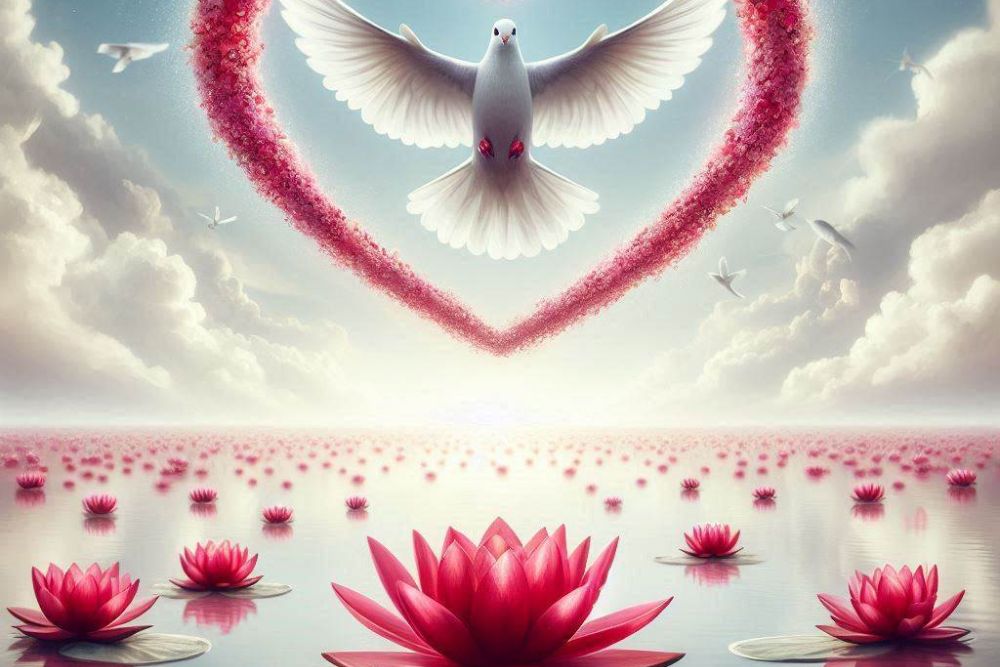
Unconditional love symbols
Ancient philosophies
As mentioned above, in ancient Greece, the term Agape was used to describe a selfless love that transcended personal desires and expectations. This type of love was considered the highest form of human affection, often associated with divine or spiritual qualities.
Beyond Agape, Greek philosophy also offered insights into the nature of happiness and human flourishing. Stoic philosophers, for instance, believed that true happiness, or Eudaimonia, could be achieved by living in accordance with nature and reason. This involved a sense of interconnectedness with the universe and a love for humanity as a whole. The same ideology can be found in other Greek scholar’s works; for instance, in his “Symposium”, Plato stated:
The truth is that we isolate a particular kind of love and appropriate it for the name of love, which really belongs to a wider whole.
In Eastern philosophies, similar concepts are also found. Confucianism emphasized Ren (仁), a principle of humaneness or benevolence that involves a deep concern for the well-being of others. While not explicitly defined as unconditional, Ren implies a love that extends beyond personal gain or familial obligations.
Now the man of perfect virtue, wishing to be established himself, seeks also to establish others; wishing to be enlarged himself, he seeks also to enlarge others.
Confucius

Religious contexts
The concept of unconditional love has long been explored by various religious traditions. Christianity, for example, places great emphasis on the idea of God’s unlimited love for humanity – which is exemplified in the belief that Christ was sent to atone for human sins (and that his followers are encouraged to follow his examples).
The Bible is filled with verses that emphasize the importance of an unwavering, all-encompassing love, such as:
I desire mercy, not sacrifice.
Matthew 9:13
The goal of this command is love, which comes from a pure heart and a good conscience and a sincere faith.
1 Timothy 1:5
Love is the fulfillment of the law.
Romans 13:10
In Buddhism, the concept of Metta (loving-kindness) encourages individuals to cultivate a sense of selfless love and empathy for all beings – including not only human beings but also animals, plants, and even inanimate objects. Additionally, Karuna (करुणा – compassion) is a fundamental Buddhist virtue, which requires one to show a deep concern for the suffering of others and a desire to alleviate it.
Let none deceive another, Or despise any being in any state. Let none through anger or ill-will. Wish harm upon another.
Metta Sutta
In Hinduism, the concept of love is also explored in various ways. The Bhagavad Gita, a sacred text, discusses divine love and the concept of Bhakti (devotion). Bhakti involves a deep and boundless love for a deity or a higher power, often leading to a sense of spiritual fulfillment and liberation.
Every act of charity, every thought of sympathy, every action of help, every good deed, is taking so much of self-importance away from our little selves and making us think of ourselves as the lowest and the least, and, therefore, it is all good.
Swami Vivekananda
Philosophical works
The concept of unconditional love has been a central theme in philosophical discourse for centuries. One of the earliest pioneers was Augustine of Hippo. In his writings, Augustine often emphasized the divine love of God as boundless – one that transcends human understanding and limitations, and is freely given regardless of human worthiness or merit. As he famously stated:
The measure of love is to love without measure.
In the Enlightenment era, Immanuel Kant’s ethical philosophy offered a unique perspective on the topic. While not explicitly using the term, his idea of Categorical imperative, which states that one should act only in such a way that they could will the maxim of their action to become a universal law, can be interpreted as a form of love that extends to all beings without exception.
Later, the concept of unconditional love was explored by Danish philosopher Søren Kierkegaard in his existentialist framework. His works on faith often discuss a leap into the unknown, a radical commitment to something beyond reason or empirical evidence.
Love does not alter the beloved, it alters itself.
Søren Kierkegaard
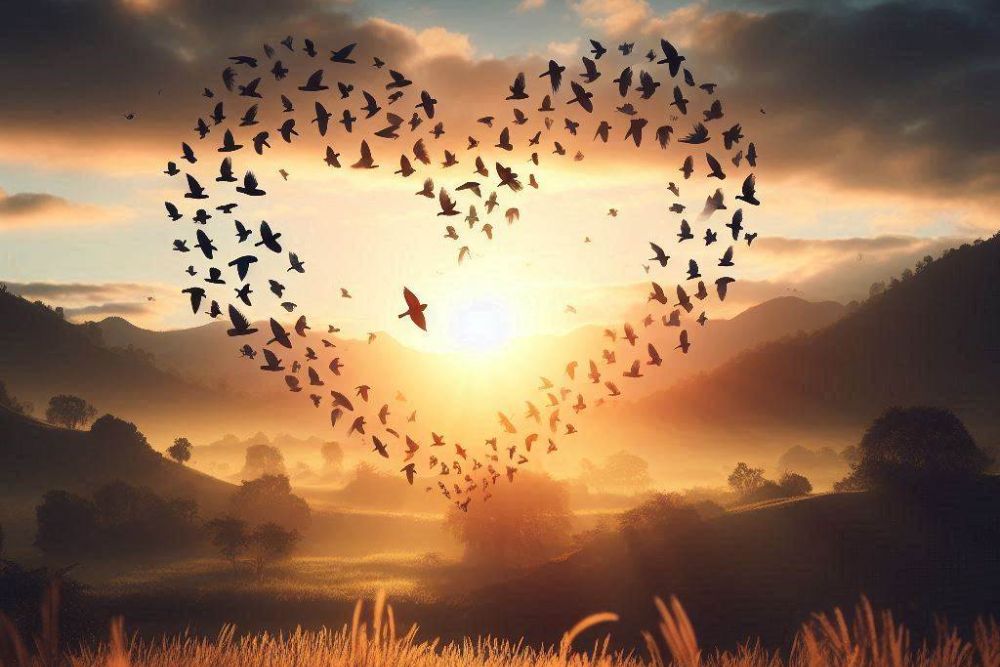
In the 20th century, Simone de Beauvoir also touched on the theme. Though not explicitly defining it, her emphasis on freedom and authentic relationships suggests a love that is free from conditions or expectations. In her work “The Ethics of Ambiguity,” Beauvoir explores the concept of “love without hope,” which, while not entirely unconditional, involves the transcendence of expectations and external conditions.
Aside from Beauvoir, Henri Bergson and Simone Weil were two other notable figures who were also interested in the theme.
- Bergson emphasized the importance of intuition and empathy in understanding the world, which could be interpreted as a call for unconditional love.
- Weil, on the other hand, saw love as a powerful force that transcends the limitations of human understanding. She argued that true love is unconditional and involves complete self-giving.
People who live by sensations are parasites, both materially and morally, in relation to those who work and create… who do not seek sensations but experience in fact much livelier, profounder, less artificial and truer ones than those who seek them.
Simone Weil
Finally, we cannot fail to mention the Golden Rule – a principle found in various religious and philosophical traditions – which offers a timeless perspective on unconditional love. Its motto “Do unto others as you would have them do unto you” promotes a love that is based on empathy and consideration for others.
Humanistic psychological perspectives
If I let myself really understand another person, I might be changed by that understanding. And we all fear change. So as I say, it is not an easy thing to permit oneself to understand an individual.
Carl Rogers
Humanistic psychologists have made significant contributions to our understanding of unconditional love. Carl Rogers, a pioneer in this field, introduced the concept of unconditional positive regard – which is about accepting and valuing individuals without judgment, regardless of their flaws or shortcomings. He believed such an attitude is essential for fostering personal growth, self-acceptance, and healthy relationships.
Another influential figure, Abraham Maslow, highlighted love and belongingness as fundamental human needs. He described a concept called “Being-love” (B-love) – a form of love characterized by seeing one’s partner as essentially perfect and extraordinary. According to him, B-love not only fosters deep, meaningful connections; it also plays a crucial part in achieving self-actualization, the highest level of psychological development.
The fact is that people are good. Give people affection and security, and they will give affection and be secure in their feelings and their behavior.
Abraham Maslow
Moving to the 20th century, Viktor Frankl, a Holocaust survivor and existential psychologist, explored the profound role of love in human life. In his book “Man’s Search for Meaning“, Frankl argued that love is the only way to truly understand and connect with another person. His experiences in concentration camps led him to conclude that even in the most difficult circumstances, love and the ability to find meaning in suffering are essential for psychological survival.
If you treat people to a vision of themselves, if you apparently overrate them, you make them become what they are capable of becoming.
Viktor Frankl

Psychology of unconditional love
Literary and poetic explorations
“Ah, the abomination! He has stolen our silver!”
“And, in the first place, was that silver ours? Madame Magloire, I have for a long time detained that silver wrongfully. It belonged to the poor. Who was that man? A poor man, evidently.”
Bishop Myriel to Madame Magloire – from Victor Hugo’s “Les Misérables”
Throughout history, countless poets and writers have captured the beauty, complexity, and enduring power of unconditional love with their works. Shakespeare’s Sonnet 116, for example, describes love as an “ever-fixed mark” that remains steadfast even in the face of changing circumstances. In his play Romeo and Juliet, the young lovers defy their feuding families and societal norms in pursuit of their love, ultimately leading to tragedy.
In addition, many other notable authors have also gone over the topic.
- Jane Austen’s “Pride and Prejudice” features a love story that overcomes initial misunderstandings and societal pressures.
- Victor Hugo’s “Les Misérables” demonstrates the transformative power of unconditional love through the character of Myriel, whose unwavering compassion has resulted in the redemption of the main character Jean Valjean, and through Valjean himself, who later sacrifices his own well-being for the sake of many other people.
- Charlotte Brontë’s “Jane Eyre” explores a love that endures despite social class differences and personal secrets.
- etc.
Modern scientific findings
In 2005, biological anthropologist Helen Fisher conducted fMRI studies to observe the brains of individuals in love. Her research found that areas rich in dopamine, a neurotransmitter associated with pleasure and reward, were highly active when people experienced romantic love. This suggests that the emotion is deeply rooted in humanity’s biology.
Further research has revealed that the brain regions associated with unconditional love are similar to those activated by maternal love. A 2009 study published in Psychiatry Research found that unconditional love involves a staggering seven areas of the brain, including regions linked to empathy, compassion, and altruism. In other words, it is not merely a romantic or religious concept – but a complex biological phenomenon.
In a more recent study, researchers identified the periaqueductal gray (PAG) as a key brain region associated with unconditional love. The PAG is also involved in fear conditioning, pain modulation, and altruism, suggesting a link between these concepts and religious beliefs.
As you may see from the analysis above, while the concept of unconditional love may seem idealistic or even unattainable, the evidence suggests that it is a very real and powerful force in human life. While it may be challenging to achieve, the rewards (potential for deep connection, personal growth, and a more fulfilling life) cannot be denied.
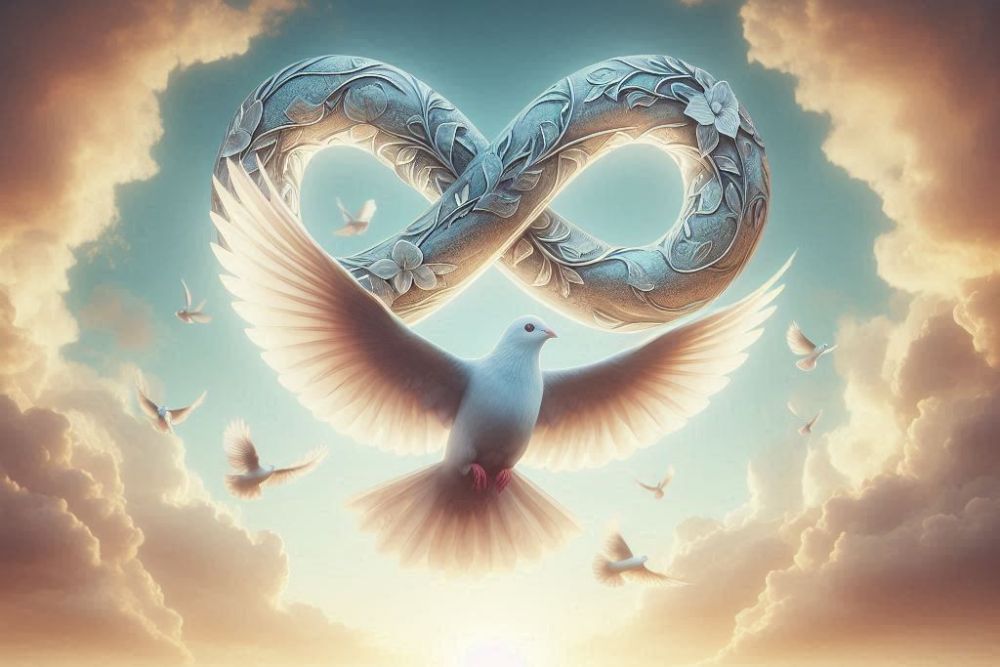
The Role of Spirituality in Understanding Unconditional Love
Unconditional love, extended to others without exception, is considered to be one of the highest expressions of spirituality. The rewarding nature of unconditional love facilitates the creation of strong emotional links. Such robust bonds may critically contribute to the survival of the human species.
Mario Beauregard
Even given the evidence above, I assume that many out there still find it challenging to embrace the concept, and I totally resonate with that. After all, it is not an ordinary type of love – in that it requires a certain level of “transcendence” to fully comprehend.
I remember when I was thinking about which category on my blog this topic would fit in, I decided to consult with a chatbot (not the most optimal way to do it, I guess, but there was no other choice. Shikata ga nai).
For a piece of content about love, you would expect it to be placed in the “Interpersonal” section, right? At least, that was my initial assumption.
Nope. Here is the reply from the chatbot.
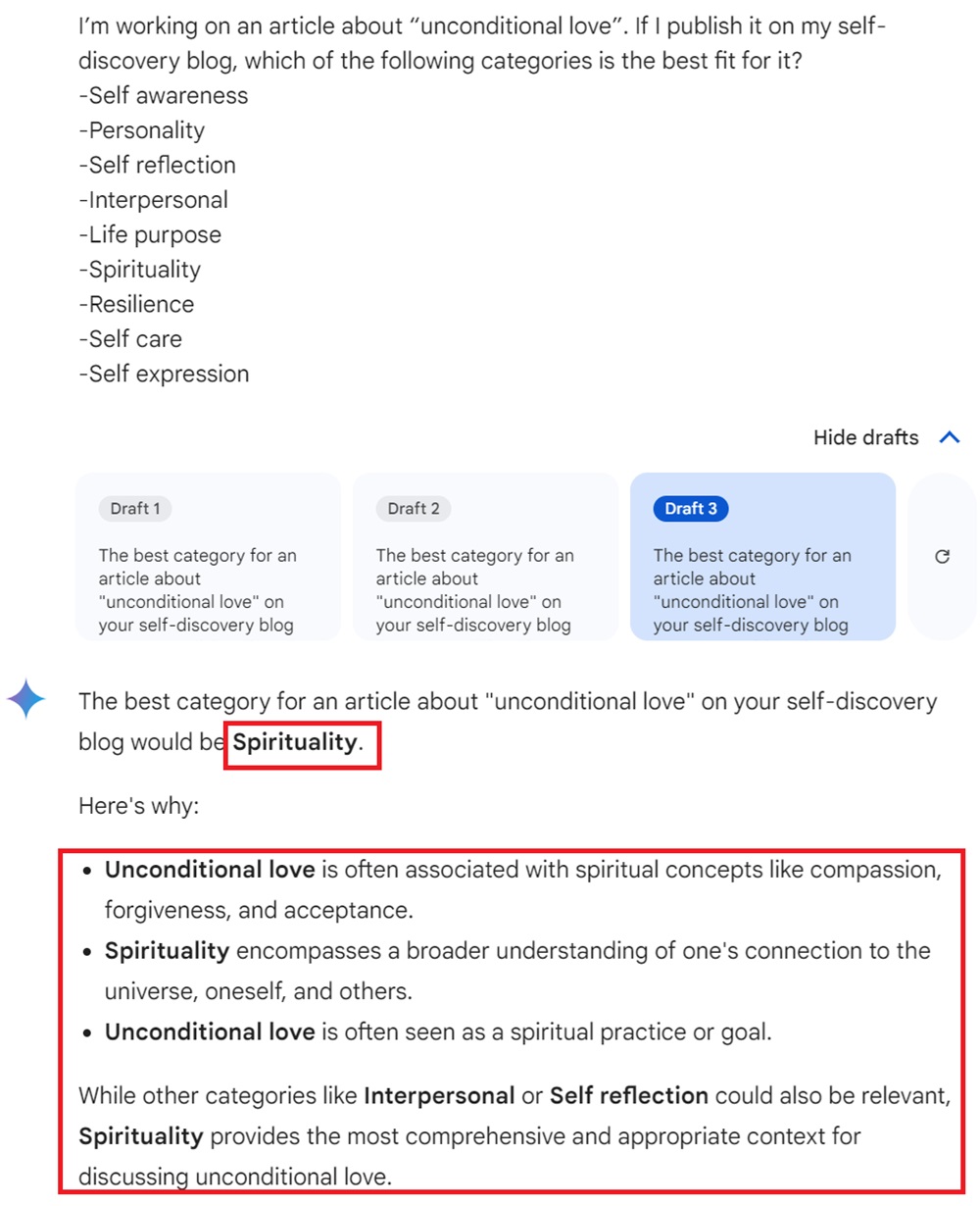
The answer above prompts me to recall John Donne’s famous line: “No man is an island“.
Why is “unconditional love” deemed as part of Spirituality rather than Interpersonal? Does it mean one has to profess a certain level of spirituality in order to wholly embrace the concept?
While romantic love is indeed a powerful expression of affection, it often comes with expectations, desires, and a sense of ownership (hence, it can be very transactional from time to time).
Unconditional love, on the other hand, goes beyond these limitations. It’s a love that is free from judgment, resentment, or possessiveness.
It extends to all beings (not just those within one’s inner circles), regardless of their worthiness or actions.
And that’s where it intertwines with spirituality – which is often attributed to a yearning for connection to something greater than oneself. Through spiritual teachings and practices such as meditation, prayer, and acts of service, one becomes equipped with the requirements necessary to experience this type of love.
Transcendence beyond the personal
When love is not possession, but participation, then it is part of that co-creation which is our human calling.
Madeleine L’Engle
The ego, often associated with self-preservation and judgment, is a common hindrance to the ability to love unconditionally. The expectations and fears that naturally stem from it are the cause of the psychological barriers that prevent us from extending the depth and breadth of our interpersonal bonds.
To truly embody unconditional love, one must transcend the limitations of their personal ego. This involves a detachment from self-interest and a willingness to love without expectation (which has been discussed thoroughly in many spiritual traditions, i.e. the concept of “emptiness” or “non-self” in Buddhism).
When we let go of the self, we open ourselves up to a deeper connection with the universe and with others.
Letting go of the self allows one to transcend the physical limitations of this world. Depending on your specific faith background, it will pave the way for you to attain either sainthood, Buddhahood, or something similar.
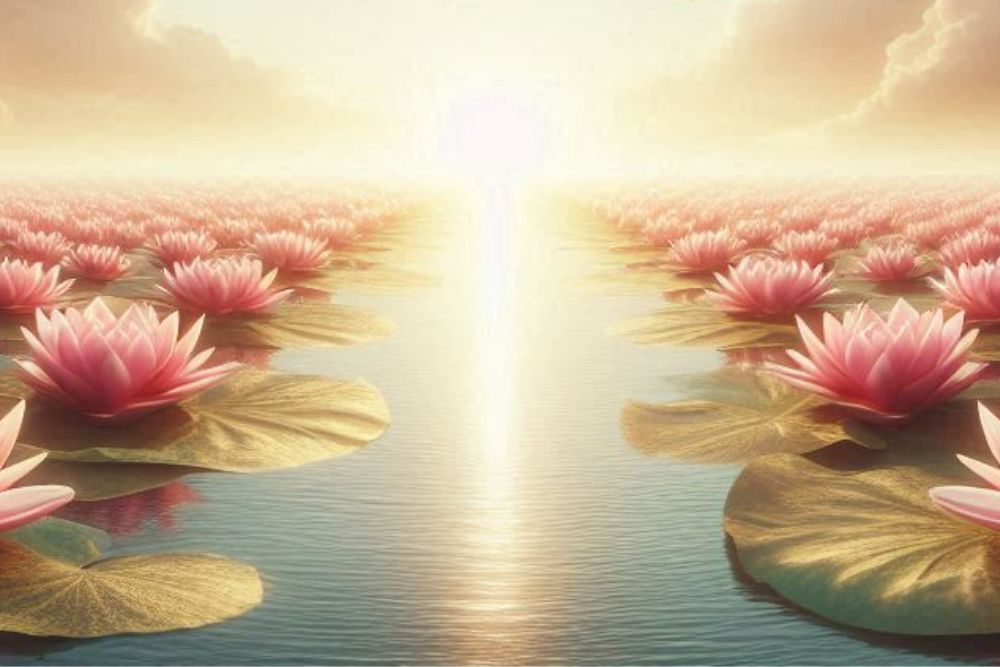
Just think about the expression that we often use: “falling in love“. Why do we say “fall” instead of “going to love”?
This is a question that my spiritual mentor once asked me when we were talking at a café one day. Without ever thinking about it before, I just answered based on my own understanding and intuition.
“Maybe it’s because love is a force that is extremely powerful – one that people cannot resist with their own will.”
Maybe the phrase speaks about the fact that in order to embrace love, we must be “melted” and give in instead of resisting. In other words, we must let go of all notions about the self.
When we are truly in love, we often lose ourselves in the other person. We are less concerned with our own needs and desires and more focused on the happiness of our loved ones.
Likewise, unconditional love requires us to be detached from our ego and focus on the well-being of others.
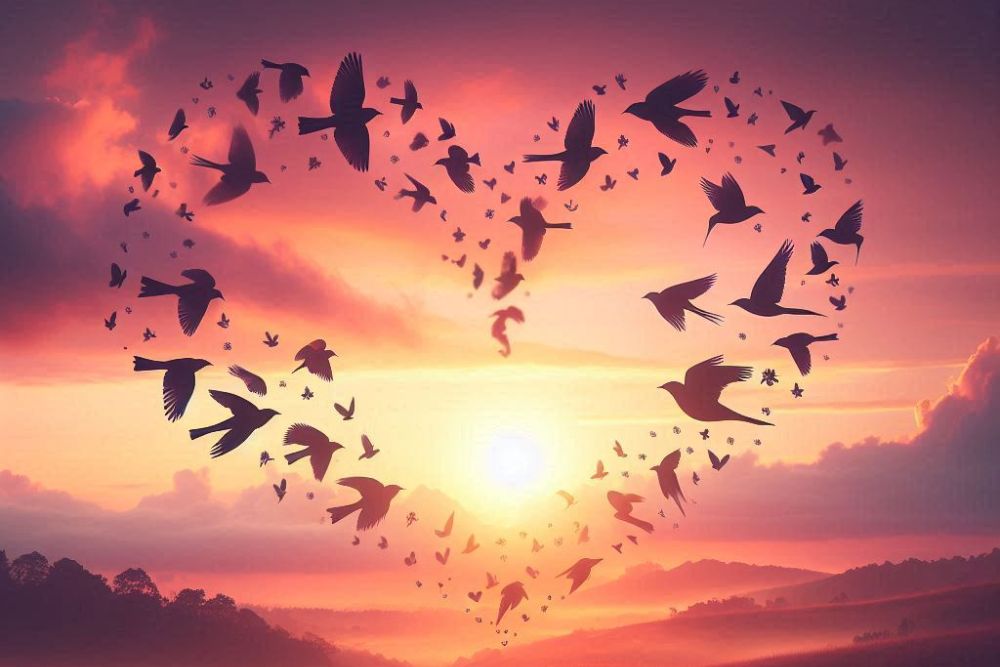
We often see examples of this kind of love in children, who are (I dare say) typically more selfless than adults (I’m not making that up – it is something that has already been suggested by certain research).
Imagine a kid who offers a toy to a friend without hesitation. They do so not because they expect something in return, but simply out of a pure desire to share.
Another example. Have you ever witnessed a situation like this? A kid is walking on the street with his parents when a beggar appears. The kid then asks his parents if he can give the beggar something.
Why would he care about the stranger anyway?
How could children demonstrate such unlimited compassion?
From my experience, I dare say that they love unconditionally because they haven’t yet developed a strong sense of self.
They do not think “If I give this to the other person, I will lose something or become lesser”.
This is not the case with many adults. As we grow older, we start drawing countless lines between what IS “me” and what IS NOT “me”. If something is not “me”, we cannot accept it.
If there’s a slight possibility that the act of giving may cause us to lose something or be in a disadvantageous position (even if there is no concrete proof for it yet), we will hesitate to do it.
That being said, even when under the influence of the ego, we are still capable of experiencing moments of unconditional love from time to time.
Think about times when you’ve helped a stranger without expecting anything in return. For instance, have you ever been asked for directions by a random driver on the road? In that case, would you hesitate to answer?
I assume that 99% of the time, we will help them without even thinking about being rewarded for the act.
Or, perhaps you’ve volunteered your time to aid a colleague in trouble – or join a cause you believe in.
These acts of selfless service are prime examples of unconditional love in action, when one transcends their personal desires and instead focuses on the well-being of others. It’s as if one has become part of something larger than oneself – and connected with a universal energy that breaks through all individual limitations!
First remove “I” that’s ego. Then remove “Want” that’s desire. See now you are left with only “Happiness”.
Buddha
A spiritual perspective makes it easier for us to see beyond the ego and recognize our interconnectedness with all beings. It is from this awareness that a more expansive and compassionate view of love may come forth.
When we love, we always strive to become better than we are. When we strive to become better than we are, everything around us becomes better too.
Paulo Coelho

Admittance of life’s impermanence
Craving and desire are the cause of all unhappiness. Everything sooner or later must change, so do not become attached to anything. Instead devote…
Buddha
The impermanence of life is a fundamental truth that underlies the practice of unconditional love. Recognizing the fleeting nature of existence is crucial for the cultivation of compassion and forgiveness. As the monk Thich Nhat Hanh has wisely observed:
Some people do not even want to look at a person when the person is alive, but when the person dies they write eloquent obituaries and make offerings of flowers. At that point the person has died and cannot really enjoy the fragrance of the flowers anymore. If we really understood and remembered that life was impermanent, we would do everything we could to make the other person happy right here and right now.
Indeed, many of us tend to wait until it’s too late to express love and appreciation. We withhold our kindness, waiting for the perfect moment or the ideal circumstance.
Many times, we hold onto grudges and refuse to love/ forgive people due to their wrongdoings (which, in truth, are not always perceived objectively).
However, the sobering truth is that life is unpredictable. Tomorrow is never guaranteed.
Those we are talking to/ about today – tomorrow they may not be anymore!
You and I may be reading this article now, but after the next 24 hours, we may end up in the grave already!
When we meet someone and fall in love, we have a sense that the whole universe is on our side. And yet if something goes wrong, there is nothing left! How is it possible for the beauty that was there only minutes before to vanish so quickly? Life moves very fast. It rushes from heaven to hell in a matter of seconds.
Paulo Coelho
Realizing this should encourage us to seize the moment, cherish our relationships, and express love and gratitude while we still have the chance.
At the same time, it is also helpful for letting go of grudges and resentments. In fact, our perceptions and judgments are often based on past experiences or limited information, which are not everlasting. When we recognize this truth, we open ourselves to the possibility of forgiveness and understanding.
When we have internalized the fact that everyone is subject to change and suffering, it becomes much easier to extend compassion and forgiveness.

I would like to mention a story about unconditional love here – the Parable of the Prodigal Son. It is a popular tale among Christian communities (and even non-Christians too). Despite the religious origin, its messages, I believe, can be appreciated by everyone, regardless of their backgrounds. (in fact, scholars have noted that there is a similar parable in Mahayana Buddhism too)
The story tells of a young man who squanders his inheritance and becomes estranged from his family. Despite his wrongdoings, his father welcomes him back with open arms. No strings attached, just pure loving – like the ocean.
When I reflect on the story, I cannot help but wonder: Why? How can the father demonstrate such boundless love?
One reason, I believe, has to do with the fact that he does not give too much weight to the past. His son, indeed, has committed grave mistakes – by asking the father for his share of the estate (which, as many scholars have pointed out, is the same as wishing his father to die) and wasting money in vain.
However, that was the past son, not the current one. He has changed and regretted his decisions.
The act of the father in the story symbolizes a profound understanding of human nature and the possibility of change. Even in the face of imperfection, love is still capable of enduring – provided we can see beyond our judgments and embrace the potential for growth!
It’s amazing how someone can break your heart and you can still love them with all the little pieces.
Ella Harper
Appreciation of our shared humanity
People at birth are naturally good. (人之初,性本善)
Mencius
One core idea found in a variety of spiritual traditions is humanity’s interconnectedness – that is, we are all inherently good, and all descend from the same source (typically referred to as the “Ultimate Reality“). This notion is reflected in concepts such as:
- Nothingness: In Buddhism, the concept of śūnyatā (nothingness) suggests that all phenomena are interconnected and interdependent. This can be demonstrated with the analogy of a wave: while a wave appears to be a distinct entity, it is ultimately made up of water. Similarly, individuals may seem separate, but they are fundamentally connected through their universal nature. As such, there is no fundamental difference between ourselves and others; we all share the same “Buddha-nature” and are capable of attaining enlightenment (even for those like the historical Devadatta).
- Image of God: Similarly, the Christian belief that humans are created in the image of God implies that all individuals possess inherent value and worth. Because there is a divine spark within everyone, people are deserving of love and respect, regardless of their actions or circumstances.
When we contemplate these concepts, we can see that both traditions emphasize the essential unity of all beings. It doesn’t matter which len you view this unity through – they both provide a powerful foundation for unconditional love.
When we recognize and appreciate our shared humanity, we move beyond superficial differences and cultivate a deeper sense of compassion and understanding. As a result, we may see beyond our own limitations and those of others, which enables us to extend love and acceptance even in the face of imperfection.
After all, from a purely secular perspective, human beings are all made up of the same things: a pile of bones, flesh, and blood put together.
Are babies so different from each other? Are elders so different from each other? And above all, are dead people so different from each other?
No matter how beautiful or handsome one is while living, after death, their body returns to the same state (which I think you can imagine yourself without me having to describe it).
When looking at the pile of skeletons and bones left behind after a genocide, can’t we realize that essentially, we are the same?

(Source: Wikimedia)
And that’s just speaking from a scientific angle – without contemplating the possibility of us all being part of the same Divine creation.
Everyone’s blood is red, everyone’s tears are salty.
Buddha
Awareness of humanity’s imperfections
Unconditional love is rooted in a deep understanding of the inherent worth – as well as imperfections of all human beings. We are all flawed, capable of making mistakes and causing suffering. Recognizing this shared humanity is essential for cultivating a compassionate and accepting attitude – and that’s where spiritual practices come in to facilitate the journey.
As many sages and spiritual teachers have observed, it’s hypocritical to judge others when we also commit the same (if not worse) atrocities.
Don’t complain about the snow on your neighbor’s roof when your own doorstep is unclean.
Confucius
How easy it is to see your brother’s faults; How hard to face your own. You winnow his in the wind like chaff, But yours you hide, Like a cheat covering up an unlucky throw.
Buddha – The Dhammapada (Chapter 18: Impurity)
Why do you look at the speck of sawdust in your brother’s eye and pay no attention to the plank in your own eye? How can you say to your brother, ‘Brother, let me take the speck out of your eye,’ when you yourself fail to see the plank in your own eye? You hypocrite, first take the plank out of your eye, and then you will see clearly to remove the speck from your brother’s eye.
Luke 6:41-42
All of the teachings above convey the same message: do not be quick to pass judgment while ignoring one’s own shortcomings. We must first address our mistakes before offering guidance to people.
When we acknowledge our own imperfections, we become more empathetic towards the flaws of others. This lays the foundation for a love grounded in compassion, acceptance, and the awareness that everyone is struggling in their own way.
Unconditional love doesn’t mean condoning harmful behavior. However, it does mean recognizing that people are complex beings with their own limitations. By understanding that everyone is doing the best they can with the resources they have, we may cultivate a more compassionate and forgiving perspective.
The beginning of love is to let those we love be perfectly themselves, and not to twist them to fit our own image. Otherwise, we love only the reflection of ourselves we find in them.
Thomas Merton
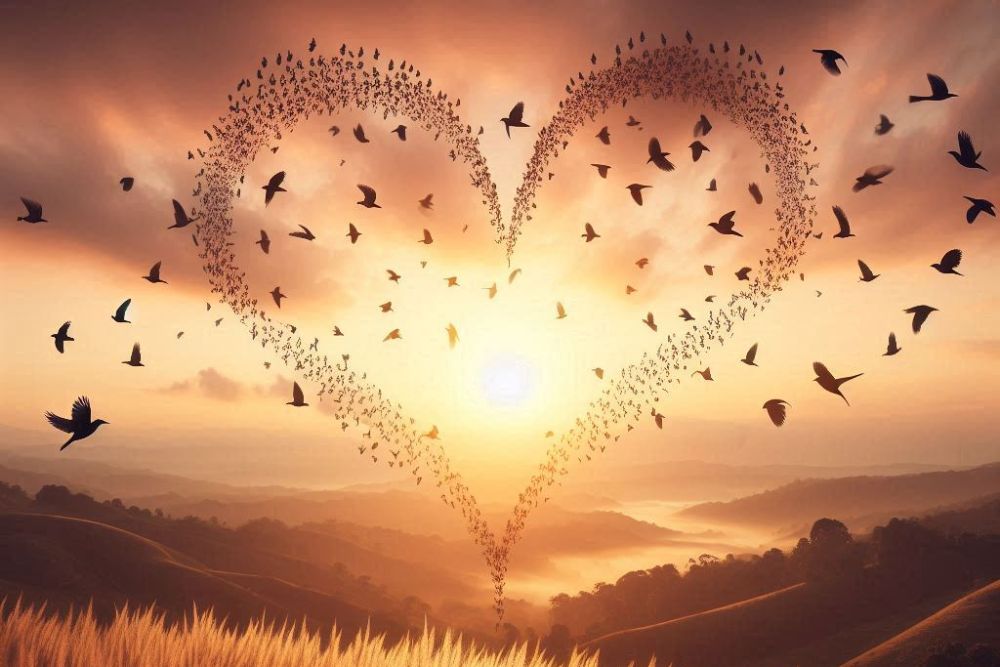
Easier said than done. Our innate tendency is to be more critical of others than ourselves. We are inherently inclined to overestimate the flaws of those around us while minimizing our own. This cognitive bias, known as the “spotlight effect,” makes it quite challenging to empathize with others.
For example, we might easily notice a minor mistake made by a colleague and immediately judge them harshly. Yet, when we make a similar error, we are likely to be more forgiving of ourselves, attributing it to a temporary lapse in judgment or external circumstances.
Recognizing this discrepancy is the first step toward overcoming it, which starts with actively cultivating self-awareness through practices such as mindfulness and self-questioning.
Many that live deserve death. And some that die deserve life. Can you give it to them? Then do not be too eager to deal out death in judgment. For even the very wise cannot see all ends.
J. R. R. Tolkien
Understanding that loving others is loving oneself
Above all, love each other deeply, because love covers over a multitude of sins.
1 Peter 4:8
When we love others, we are essentially loving ourselves. This is because our relationships with others are mirrors that reflect our inner state.
When we hold onto resentment, anger, or bitterness, we are essentially poisoning ourselves. These negative emotions sow the seeds of physical and emotional suffering. Conversely, when we cultivate love and compassion, we nourish our own well-being and free ourselves from the burdens of the past.
The Buddha’s story about the angry man offers a powerful illustration of this principle. When someone throws anger or hatred at us, we have the choice to accept it or reject it.
If we choose to accept it, we are essentially taking on their toxic emotions, harming ourselves in the process.
Holding onto anger is like drinking poison and expecting the other person to die.
Buddha
By choosing love over hate, we not only improve our relationships with others but also cultivate inner peace and happiness. This is the essence of unconditional love: a harmonious balance between self-love and love for others.
As the Dhammapada teaches:
Hatred is not appeased by hatred in this world. By non-hatred alone is hatred appeased.
Unconditional love is essentially love that stems from the awareness that everyone makes mistakes, and that everyone is suffering.
When we respond to negativity with compassion, we break the cycle of suffering and promote peace within ourselves and in our relationships.
Be devoted to one another in love. Honor one another above yourselves.
Romans 12:10
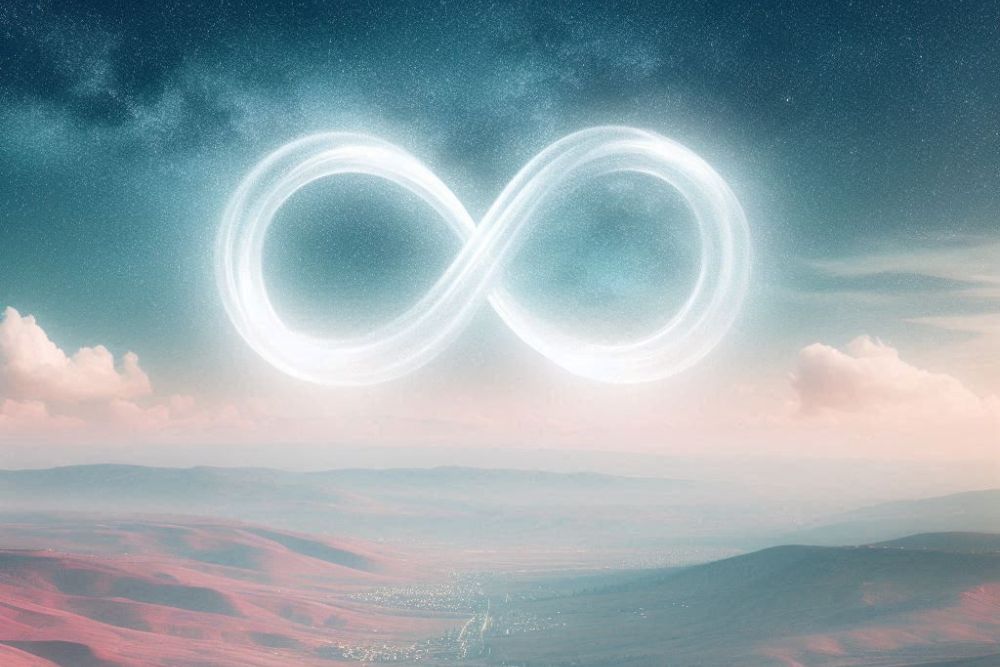
Detachment from worldly standards
Until he has unconditional and unbiased love for all beings, man will not find peace.
Buddha
Unconditional love often requires us to transcend conventional societal standards and expectations. These standards, while important for maintaining order and justice, may sometimes hinder our ability to love others.
Imagine this scenario. A teacher is preparing to give a final exam. One of his his weaker students, who has worked hard throughout the semester, approaches him with a plea for extra credit.
While the student’s performance has been lackluster, the teacher, recognizing his potential and proven dedication, decides to give him a challenging extra credit assignment.
The teacher’s decision, though seemingly unfair to the students who have consistently excelled, reflects a deeper understanding of the learning process. Specifically, it demonstrates a commitment to fostering growth and development, rather than solely focusing on grades and performance.
In a world focused on material gain and personal success, it is truly challenging to let go of expectations and judgments. Unconditional love, however, invites us to embrace a more holistic perspective – and to let go of our preconceived notions of fairness and justice. This doesn’t mean compromising our values – but rather recognizing that sometimes, love and compassion may require us to make exceptions.
Have you not seen it already? Normally, a person who has committed a serious wrong should be punished. In some cases, however, forgiveness and reconciliation may be more important than punishment, especially if the offender has shown genuine remorse and is committed to making amends.
Some may say “Nah, such tolerance will only deconstruct the whole social system.”
However, I bet their response will be much different if they happen to be a close relative (e.g. parent or offspring) of the offender.
Why the difference in terms of response then, if not because of love?
As ancient scriptures have suggested, social frameworks are meant to keep those who have not been “enlightened” in control (thereby maintaining harmony). On the other hand, those who have attained a higher level of spiritual understanding are capable of transcending the limitations of conventional morality.
We know that the law is not meant for a righteous person, but for the lawless and rebellious.
1 Timothy 1:9

Similarly, the Buddha taught that while the Dharmas (spiritual teachings) are helpful for cultivating goodness, they should not become a burden or a hindrance to spiritual liberation. True freedom comes from letting go of attachments and expectations, including those imposed by societal standards and even religious guidelines.
When you move your focus from competition to contribution, life becomes a celebration. Never try to defeat people, just win their hearts.
Buddha
Realizing the very blurred lines between personal and collective benefits
We’re all human, aren’t we? Every human life is worth the same, and worth saving.
J. K. Rowling
Unconditional love involves a profound understanding of the interconnectedness between personal and collective well-being. When we love others selflessly, we are not only benefiting them – but also contributing to the greater good.
Countless stories throughout history illustrate this principle. Mothers who donate organs to save their children, soldiers who sacrifice their lives for their comrades, and monks/ priests/ residents who risk their own safety to shelter others in times of crisis are all examples of individuals who have demonstrated a love that knows no bounds.
Why would they do that?
I believe their actions were driven by a deep sense of compassion, empathy, and a desire to make a positive impact on the world. By putting the needs of others before their own, they have made their contribution to a more harmonious and just society.
Through their selfless acts, these people have left behind a legacy that helps shape the moral and ethical landscape of future generations.
Greater love has no one than this: to lay down one’s life for one’s friends.
John 15:13
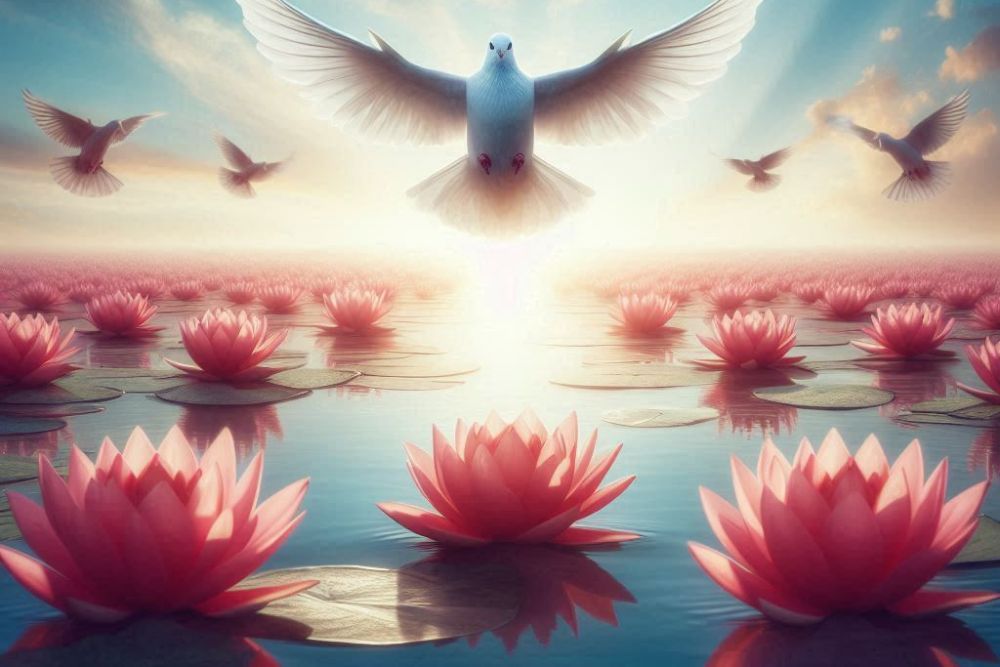
What causes unconditional love
While we may not all be called upon to make such extraordinary sacrifices, we can all practice unconditional love in our daily lives – by offering kindness, compassion, and support to those around us.
While they may not result in a miraculous effect like the Sacrificial Protection charm in Harry Potter, each simple act we do daily does leave behind a “mark”.
When you let go of the self for the greater good/ for someone you love, you leave behind a moving example that inspires others to follow suit, hence helping keep society’s morals at a high standard.
And over all these virtues put on love, which binds them all together in perfect unity.
Colossians 3:14
Real-life Examples of Unconditional Love
Hatred stirs up conflict, but love covers over all wrongs.
Proverbs 10:12
The world is filled with countless stories of individuals who have demonstrated the power of unconditional love. From heroic acts of sacrifice to everyday expressions of kindness, their stories serve as a source of inspiration for us to embrace compassion and empathy in our own lives.
- Albert Schweitzer: A medical missionary and philosopher who established a hospital in Africa to provide care to thousands of people, regardless of their ability to pay.
- Nicholas Winton: A British banker who risked his life to rescue hundreds of Jewish children from Nazi-occupied Czechoslovakia during World War II.
- Father Maximilian Kolbe: A Polish Catholic priest who voluntarily took the place of a fellow prisoner condemned to starvation in a Nazi concentration camp.
- Oskar Schindler: A German businessman who saved the lives of over 1,100 Jews during the Holocaust by employing them in his factories.
- Mahatma Gandhi and Martin Luther King Jr.: Civil rights leaders whose philosophies of nonviolent resistance and love were instrumental in driving lasting social change.
- Mother Teresa: A Roman Catholic nun who dedicated her life to serving the poor and marginalized.
- Rescuers of the Rwandan Genocide: Individuals who risked their own lives to protect others during times of great suffering and violence.
- etc.
Beyond these historical figures, we all observe countless acts of unconditional love every day, don’t we?
A stranger helping a lost child, a neighbor bringing food to a sick friend, a teacher going above their job description to better inspire their students, or a parent offering support to a struggling child – these are all examples of the love that can be found in the simplest of gestures.
Resolve to be tender with the young, compassionate with the aged, sympathetic with the striving, and tolerant with the weak and wrong. Sometime in your life, you will have been all of these.
Buddha

Is Unconditional Love Healthy or Not?
My answer is simple: It depends.
Depending on the context, the love you share with another person may turn out healthy or not.
There are certain requirements, but I’ll talk about them later. For now, I would like to present to you evidence that supports the benefits of practicing unconditional love – first. After we’ve wholly embraced its necessity, we’ll discuss what it takes to make it truly last later.
Improved wellbeing
Serenity comes when you trade expectations for acceptance.
Buddha
Research suggests that this type of love activates regions of the brain associated with reward and pleasure, creating a sense of fulfillment even in the absence of reciprocation.
A study conducted at Montreal University revealed that unconditional love involves a complex interplay of brain regions, distinct from romantic or maternal love. This suggests that the act of giving love without expecting anything in return is inherently rewarding. Participants who cared for individuals with learning difficulties exhibited heightened brain activity in areas linked to the reward system while viewing photos of their loved ones.
Studies have consistently shown that those who experience unconditional love report increased happiness, self-esteem, and resilience. Knowing that one is loved for who they are, regardless of their flaws or actions, fosters a positive self-image and a sense of belonging.
Another research from UCLA demonstrates the long-lasting effects of unconditional love, particularly in childhood. Children who receive higher levels of affection from their parents are more likely to develop emotional well-being, lower anxiety, and greater resilience in adulthood. Additionally, they may also experience fewer mental health symptoms and improved overall health.
Beyond childhood, the benefits also extend into adulthood – including a significant reduction in depression and the alleviation of the negative impacts caused by stress.

All in all, based on the findings above, we can safely conclude that love, especially one that is unconditional, provides a way to find peace in this chaotic world, in your chaotic life, amidst the many uncertainties and twists. It is an anchor for you when things do not go out as planned – when people treat you/ you treat them in ways that deviate away from the expected.
Read more: Gaman (我慢) – The Power of Silent Endurance in the Face of Hardships
A better community
If you love those who love you, what credit is that to you? And if you do good to those who are good to you, what credit is that to you? And if you lend to those from whom you expect repayment, what credit is that to you?
Luke 6:32-34
The quote above, despite its religious context, can be interpreted and appreciated by those who do not subscribe to religious beliefs. Indeed, true moral character is revealed not in how we treat those who are kind to us – but in how we extend love and kindness to those who are difficult or adversarial.
By extending love and kindness to all, regardless of their circumstances, we cultivate a sense of empathy, compassion, and understanding. This moral growth not only enriches our personal lives but also contributes to a more harmonious and equitable society.
When we love and support others without expecting anything in return, we build trust and create a foundation for lasting connections.
By extending love and kindness to everyone, regardless of their circumstances, we help break down barriers, promote understanding, and create a more compassionate society. This is especially significant in today’s world, where divisions and conflicts are prevalent.
Love is the only force capable of transforming an enemy into a friend.
Martin Luther King Jr.

And if you profess a certain level of faith in the power of consciousness – how it has the ability to shape realities (like how Masaru Emoto has concluded from his water crystal experiments), then you can be sure that practicing unconditional love is one of the best ways to save this world from its impending doom.
Love and thanks have the same vibration no matter what the language. These are words that can be understood by everyone in the world.
Masaru Emoto – “The Secret Life of Water”
Return to humanity’s core
Whatever our souls are made of, his and mine are the same.
Emily Brontë
This is a benefit that I find quite challenging to explain – partly because of its abstractness, and because it concerns an advocation for religions.
As you should already know by now, unconditional love is something found mostly in religious and spiritual teachings. If you are looking for advice from a dating expert or similar secular resources, I assume that the explanation you find will be completely different.
Why?
I think it’s because of the way traditional science and psychology view humanity – separate entities that are independent of each other.
That is another story when it comes to religions, most of which state that all human beings originate from the same source, and therefore are intertwined and dependent.
After all, the term “religion” comes from the Latin word “religio,” which is believed to be derived from the verb “religare,” meaning “to bind together” or “to connect.” In other words, the original concept of religion involved a re-connection to something that we used to be. A re-connection to a greater whole – to each other.
Despite differences (and limitations/ corruption that occurs over time), all religions are meant to act as a bridge for humanity to return to their original selves.
And unconditional love is one thing that can get us from “here” to “there”. Back to the original transcendent essence.

Have you ever felt it? A deep sense of peace and belonging – perhaps after helping someone in need, forgiving a past wrong, or simply letting go of negative emotions.
These experiences all give a momentary glimpse of our true selves, unburdened by the limitations and conditioning imposed by ego and societal expectations.
The guidance and teaching of nature are sufficient to show that man was created for the sake of man. Hence it is inferred that there is a mutual obligation between all men.
John Calvin

A love grounded in empathy, compassion, and a sense of interconnectedness enables us to break free from all constraints. It invites us to embrace our shared humanity and to recognize that our well-being is inextricably linked to that of others.
Through the practice of unconditional love, we can gradually dismantle the barriers that separate us, returning to a state of harmony and wholeness. This is the essence of returning to humanity’s core (which is about reconnecting with our innate potential for love, compassion, and wisdom), a journey that will lead to greater peace, joy, and fulfillment in our lives.
The moment you have in your heart this extraordinary thing called love and feel the depth, the delight, the ecstasy of it, you will discover that for you the world is transformed.
Jiddu Krishnamurti
Components of Unconditional Love
Compassion
True love is born from understanding.
Buddha
Compassion and empathy form the bedrock of unconditional love. These qualities allow us to connect deeply with others, understanding their experiences and emotions without judgment.
When we are compassionate, we feel a sense of concern and care for the well-being of those around us. We recognize that our loved ones are human beings who experience pain, suffering, and challenges; hence, we authentically desire to alleviate their pain and offer support.
Empathy, on the other hand, is the ability to resonate with and share the feelings of another person. It involves putting oneself in their shoes, imagining their perspective, and experiencing their emotions vicariously.
When we empathize with someone, we may better appreciate their actions and reactions, even if we do not agree with them. This mindset enables us to bridge the gap with others and support them through difficult times. For example, when we notice a friend seems socially withdrawn after her mother’s death, we understand that her behavioral tendencies are normal, and we (as friends) should be willing to offer gentle encouragement to her.
Better than a thousand hollow words is one word that brings peace.
Buddha

Non-attachment
There is no fear in love. But perfect love drives out fear, because fear has to do with punishment. The one who fears is not made perfect in love.
1 John 4:18
Non-attachment involves cultivating a sense of detachment from material possessions, outcomes, and expectations – while maintaining a deep connection with life and others. It starts with contentment – finding joy and satisfaction in the present moment without being overly dependent on external circumstances. By embracing life as it is (both the positive and negative aspects), we become less likely to cling to things or people out of fear or need (which is a hindrance to unconditional love).
What does that mean anyway?
It means just letting things be, without forcing anyone/ anything to be as we want them to be. Just like the concept of Wuwei (無為) in Daoism, we should not try to rush things and break the orders of the universe.
It is what it is. We should not coerce people to change or comply with any of our standards if we truly care for them.
Though we should definitely set boundaries in certain circumstances (which I will talk about later), it’s up to others to make their choice. And everyone will reap the fruits of what they have sown.
Nature does not hurry, yet everything is accomplished.
Lao Tzu

For those who would like to tread this path, I suggest you adopt a minimal lifestyle – focusing on the essentials and letting go of excess possessions. Simplifying our lives is a sure way to free ourselves from the burden of material possessions and cultivate a greater sense of inner peace.
If you love something so much let it go. If it comes back it was meant to be; if it doesn’t it never was.
Albert Schweitzer
Patience & self-moderation
The greatest prayer is patience.
Buddha
These two qualities go hand-in-hand with unconditional love. Patience is the ability to endure hardship, delay, or frustration without becoming angry or irritated. It requires one to cultivate a calm and composed demeanor, even in the face of adversity. When we are patient, we are better equipped to respond to challenges with calm and understanding, rather than anger or frustration. This creates a more positive and supportive environment for our relationships.
Similarly, with self-moderation, we are less likely to act out of selfishness or greed. Rather than imposing unrealistic expectations onto ourselves or others, which will just lead to disappointment and resentment, we learn to adopt a more mature and compassionate approach to relationships.
Gratitude
We can let the circumstances of our lives harden us so that we become increasingly resentful and afraid, or we can let them soften us and make us kinder and more open to what scares us.
Pema Chodron
A powerful force that has the potential to transform relationships and lives, gratitude is closely linked to unconditional love. When we learn to appreciate the positive aspects of our experiences, both big and small, we shift the focus away from what we lack toward what we have – which enables us to feel more content, fulfilled, and connected to others.
When we are grateful for our loved ones, we are more likely to appreciate their strengths while overlooking their shortcomings. Additionally, we are also more likely to express our love and appreciation for them without any strings attached.
Cultivating gratitude can be as simple as taking a few moments each day to reflect on the things we are thankful for – health, loved ones, life experiences, or even the beauty of the natural world.
Read more: 200 Self-reflection Questions – Toolkit for Life Pilgrims

Sense of responsibility
When you’re in love, every day is filled with anticipation and joy, but accommodating another person in your life may require that you sacrifice your free time, your money, and your space.
Masaru Emoto
These days, many people enter into romantic relationships (and other relationships too) without even thinking about the commitments that will naturally follow after that (e.g. they can no longer freely visit the coffee shop on the weekend; they have to spend more time for family activities rather than pursuing personal interests, etc.). To me, it is a grave mistake that we should refrain from at all costs.
Responsibility is part of love. When we love people, we have to recognize our obligations to them and strive to fulfill them to the best of our ability.
When we feel a sense of responsibility for our loved ones, we cannot help but do our best to prioritize their needs and well-being, even if things are challenging or if it comes at a personal cost.
When problems arise, rather than blaming others or making excuses, we acknowledge our mistakes and make amends – which helps build trust and strengthen the relationship.
If you love someone but rarely make yourself available to him or her, that is not true love.
Thich Nhat Hanh
Mindfulness
Far too often, we are distracted by our own thoughts or worries, which hinder our ability to connect deeply with others. Unconditional love requires us to focus on the moment-to-moment experience of being with our loved ones, and that’s where mindfulness comes in. Not only improving the quality of daily interactions, being mindful also makes us more adept at managing anger and reflecting on our thoughts and feelings before responding (thereby communicating more effectively and resolving conflicts more peacefully).
Humility
There is no need of a teacher for those who know how to think.
Mahatma Gandhi
An arrogant and judgmental mindset is what prevents many people from extending their love. However, the truth is that none of us are perfect. We all make mistakes from time to time; being obsessed with people’s limitations is not only un-constructive – but also hypocritical.
Being humble is about acknowledging one’s shortcomings and approaching others with respect and openness. It’s about recognizing the value of others and their contributions, even if they differ from what we expect. Such an attitude is crucial for demonstrating compassion under all circumstances.
All streams flow to the sea because it is lower than they are. Humility gives it its power.
Lao Tzu

Faith
There is force in the universe, which, if we permit it, will flow through us and produce miraculous results.
Mahatma Gandhi
Faith, often overlooked in discussions of unconditional love, is a vital component that can significantly deepen and strengthen our connections with others. It provides a foundation of trust, hope, and belief for sustaining relationships through challenging times.
When we have faith in our loved ones, we believe in their inherent goodness and potential. We trust that they will do their best, even if mistakes are still possible. This mindset gives rise to a sense of security and stability that allows us to feel safe and supported. In case our loved ones stumble, we understand that they may be going through challenges that we cannot fully comprehend, and we are willing to offer support and encouragement.
Faith also involves a belief in the power of love itself. It is the conviction that even when circumstances seem bleak, things will improve. That there is a higher purpose to our struggles, and that love will ultimately prevail.
When you begin to touch your heart or let your heart be touched, you begin to discover that it’s bottomless, that it doesn’t have any resolution, that this heart is huge, vast, and limitless. You begin to discover how much warmth and gentleness is there, as well as how much space.
Pema Chodron

Best Practices for Loving Unconditionally
Cultivating mindfulness
The most important aspect of love is not in giving or the receiving: it’s in the being. When I need love from others, or need to give love to others, I’m caught in an unstable situation. Being in love, rather than giving or taking love, is the only thing that provides stability.
Ram Dass
As mentioned, unconditional love is rooted in compassion, a quality that can be cultivated through mindful practices. Research at James Cook University has shown that meditation, particularly loving-kindness meditation (LKM), helps strengthen the neural pathways associated with compassion (specifically, those found in the temporal parietal juncture as well as the insula).
Mindfulness also plays a crucial role in detaching from disturbing emotions (kleshas), which cloud our judgment and prevent us from extending genuine compassion. When we are caught up in negative thoughts and feelings, it becomes difficult to love unconditionally.
For example, when faced with the decision to donate, fear of financial insecurity might prevent us from giving freely. We may hesitate out of the fear that giving up what we have now may cost us the opportunity for something else (e.g. advancing in our career, helping family, etc.). Feelings of uncertainty about the future prevent us from extending compassion toward others.
Through mindfulness practices, we learn to let go of these limiting beliefs and cultivate a sense of inner peace and contentment. Reducing the influence of kleshas creates space for love to flourish without limits.
Thinking prevents us from touching life deeply. I think, therefore I am not really there.
Thich Nhat Hanh

Such a feat is not easy. To be honest, even I am still trapped within my own cycle of disturbing emotions. While I may still be grappling with challenges from time to time, I strongly hope that my experiences will offer insights and encouragement to others.
Engaging in spiritual practices
Spiritual practices, such as prayer, chanting, rituals, and mantras, provide a profound connection to something greater than oneself. These activities are all helpful for cultivating a sense of peace, gratitude, and love, all of which are essential for unconditional love.
Most of the time, we are already aware of what we should do; all we need is a reminder. And that’s where mantras come in – sacred words/ phrases repeated mentally or verbally to reinforce one’s intentions, values, and beliefs. Regular repetition of a mantra leaves an imprint on the subconscious mind, making it a powerful tool for guiding decisions and cultivating positive qualities such as love, compassion, and peace.
Mantras have effect: the mere repetition of words….
Swami Vivekananda

Prayer is another powerful tool for fostering love. Whether you pray to a higher power, a loved one, or simply to some kind of inner wisdom within yourself, the act of praying should prove to be a transformative experience – in that it enables you to be connected with a deeper sense of meaning and purpose.
As a Catholic, one text I find deeply heart-warming is the Peace Prayer. Its simple, yet beautiful verses serve to remind me of the importance of cultivating peace, love, and forgiveness in my own life.
How about yours?
(As a side note, I would like to point out that it’s possible for one to come up with their own mantra/ prayer that best suits their taste – instead of relying on existent texts. Feel free to be creative!)
Even in these present days when science reigns supreme, we still pray. What heart doesn’t pray when a sick child clutches to life or when a loved one is far away?
Masaru Emoto
Investing in interpersonal communication
To be able to give happiness and joy, you must practice deep looking directed toward the person you love. Because if you do not understand this person, you cannot love properly. What must we do in order to understand a person? We must have time; we must practice looking deeply into this person. We must be there, attentive; we must observe, we must look deeply. And the fruit of this looking deeply is called understanding.
Thich Nhat Hanh
Effective communication is the cornerstone of any healthy relationship – and even more so when it comes to love. Key elements of effective communication include:
- Openness and honesty: Sharing one’s thoughts, feelings, and needs openly and honestly is essential for building trust and intimacy.
- Non-defensiveness: Communication thrives when one does their best to refrain from acts such as blaming and criticizing.
- Shared power: Both parties have an equal say and contribute equally to decision-making.
- Curiosity: Even in long-term relationships, it’s important to maintain a sense of curiosity and wonder. Asking questions, listening attentively, and exploring new experiences together are essential for understanding others and keeping the connection fresh and exciting.
- Seeking help: When we are struggling, it’s important to reach out to others for support – whether by talking to a trusted friend, family member, coach, or therapist. Remember, it’s okay to ask for help, and it doesn’t mean that one is weak or incapable.
You must always check things out by going to the person in question and asking for his or her help: “Dear one, I am suffering so much, help me please.”
Thich Nhat Hanh
Forgiving
Forgiveness is choosing to love. It is the first skill of self-giving love.
Mahatma Gandhi
Have you ever felt it? When you cannot forgive a person for something, you feel as if there’s something heavy in your chest – something that you despise, but cannot let go of.
It’s as if some kind of toxic is building up within your heart. You know it’s bad, and yet you would like it to stay rather than to disperse.
It’s an intriguing fact that far too often, we prefer drinking poisons over antidotes.
When we hold onto grudges and negative emotions, we are essentially “dying” inside. Forgiveness, on the other hand, allows us to release these toxins and open our hearts to understanding. It liberates us from the burdens of resentment, anger, and bitterness, thereby opening a “gateway” for us to transcend ourselves and experience an unmatched sense of peace.

I have to admit that it’s not something simple to do. Sometimes, I find myself deeply insulted by people’s behaviors and so unwilling to forget about them.
The thing is, emotions are a natural part of humanity. We cannot suppress them; we can only keep them at a distance and observe them (which is achievable with spiritual practices such as meditation and praying).
Forgiveness is not pretending that the act was not there; it’s just that you know there’s a reason behind it, and are ready to let go of the negativity that comes with it.
If we are mindfulness, if we are love, we are also ignorance, we are also suffering, and there is no reason to suppress anything at all.
Thich Nhat Hanh
The journey of forgiving starts with actively focusing on people’s good qualities – their “Buddha-nature”/ “Divine spark”. As challenging or awkward as it may seem, reframing one’s thoughts has been proven to work by various psychological research.
When we do our best to adopt a specific behavior or mindset, it will, over time, result in a significant change in the internal state.
When you act as if you love your neighbor (even if you don’t actually feel that way), you will gradually develop genuine feelings of love and affection.
It’s a fascinating fact, right? Being able to influence our thoughts and beliefs with the accumulation of small actions over time. While it may seem uncomfortable initially, if we can get over the discomfort and maintain the spree, soon “the carp will transform into the dragon”.
Do not waste time bothering whether you “love” your neighbor; act as if you did. As soon as we do this we find one of the great secrets. When you are behaving as if you loved someone you will presently come to love him.
C. S. Lewis
The only thing that matters is: Are we willing to see through the differences? Are we willing to let go of resentments in the beginning?
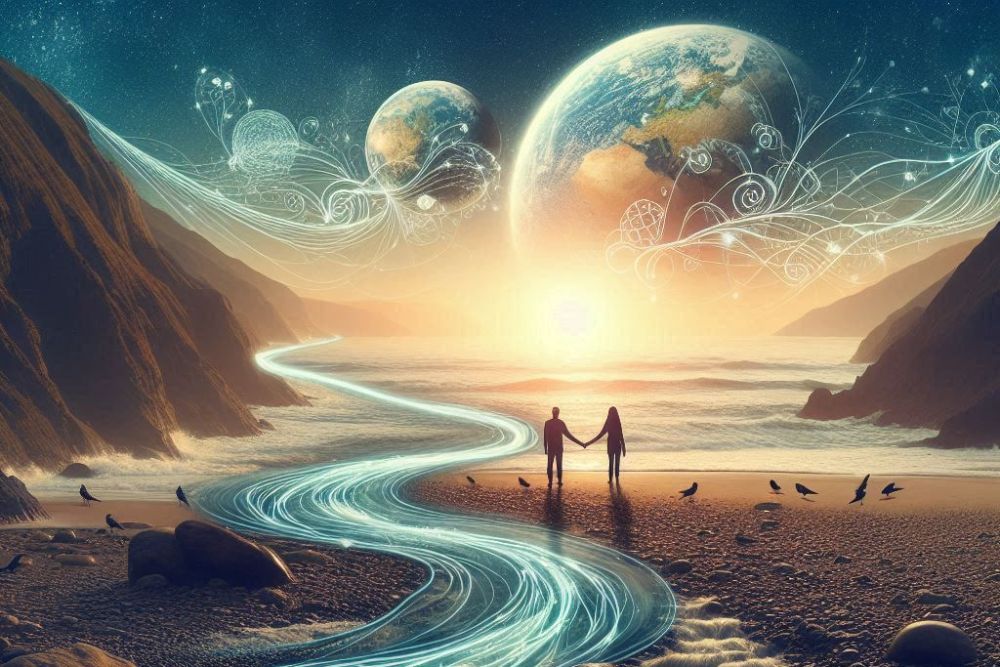
Let us revisit the story of Oskar Schindler. Initially a member of the Nazi Party, he then witnessed the atrocities committed against Jews as World War II progressed. Moved by a sense of humanity, he started using his influence to protect Jewish workers. He bribed Nazi officials, forged documents, and even sheltered Jews in his factories to shield them from deportation to concentration camps.
Regardless of social, religious, or ethnic differences, one is called to love their neighbors unconditionally, without succumbing to notions of prejudice and discrimination. As John Calvin has asserted:
Mankind is knit together with a holy knot.
Unconditional love is always possible, if one is aware of this simple truth and dares break down all the barriers that they or others have set up to prevent them from reaching people.
Read more: Silence Movie Review – A Meditation on Suffering, Doubt, and the Price of Belief
Loving yourself
You can’t pour from an empty cup. Take care of yourself first.
Unknown
Self-love is the cornerstone of a fulfilling and compassionate life. When we love ourselves, we are better equipped to extend love and kindness to others.
It’s like filling a cup with water before pouring it out for others. If our own cup is empty, we won’t have anything to give.
Self-love and love for others are not mutually exclusive. In fact, they are deeply interconnected.
When we love ourselves, we are more likely to see the inherent value and worth in others.
Conversely, when we love others, we develop a greater sense of self-worth and appreciation as a result.
True altruism is not about guilt-driven behavior, which stems from the thinking “I need to be like this”, or “I need to be like that”. Instead, it is about recognizing the interconnectedness of all beings and acting with compassion and kindness.
When we care for ourselves, we are more likely to extend love to others without expecting anything in return.
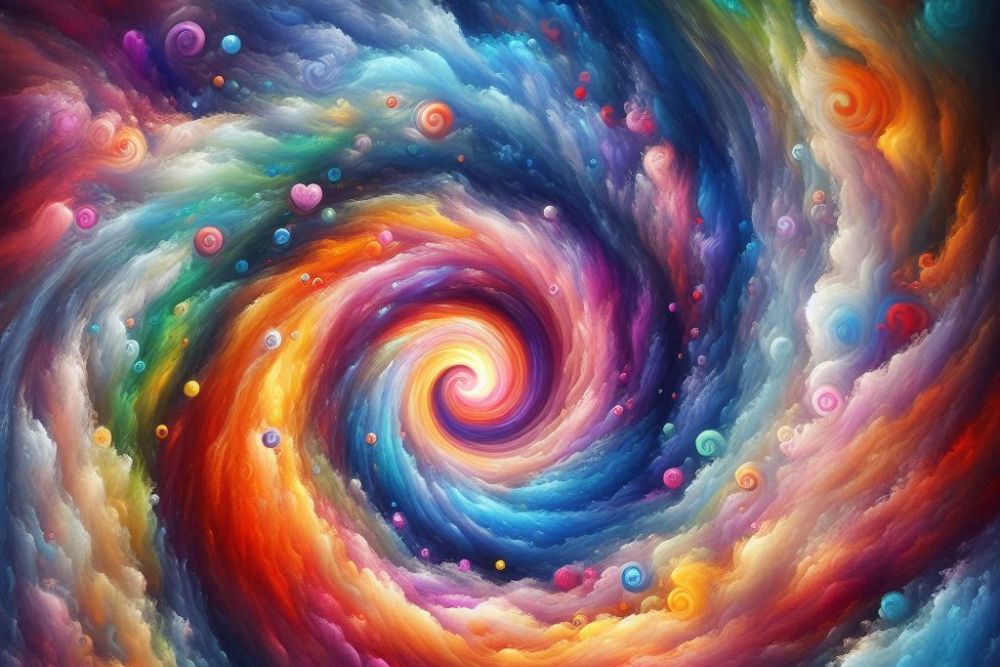
Cultivating self-love may take time, but it is a worthwhile journey. Here are some strategies that can help:
- Practice self-compassion: Be kind and understanding to yourself, especially when you make mistakes or face challenges.
- Set healthy boundaries: Learn to say “no” when necessary and prioritize your own needs.
- Engage in self-care activities: Take time for activities that nourish your body, mind, and spirit.
- Affirm your worth: Remind yourself of your strengths, accomplishments, and positive qualities.
- Surround yourself with positive people: Spend time with people who uplift and support you.
The object of your practice should first of all be yourself. Your love for the other, your ability to love another person, depends on your ability to love yourself.
Buddha
Adjusting the environment
Some people have commented (which I myself wholeheartedly agree with) that it’s far easier to be loving and compassionate within the confines of a monastery than in the external chaotic world.
While it may be easier to practice spiritual disciplines in a quiet and peaceful setting, such as a monastery, it’s important to remember that unconditional love can be cultivated anywhere. The key is to establish an environment that supports your spiritual growth and well-being by:
- Minimizing distractions: Reduce noise, clutter, and other distractions that interfere with your peace of mind.
- Finding your “tribes”: Spend time with people who uplift and support you.
- Engaging in activities that promote relaxation: Practice mindfulness, meditation, yoga, or other activities to stay relaxed and better manage stress.
- Limiting exposure to negativity: Minimize exposure to negative news, social media, and toxic relationships.
Sometimes, it may be a great idea to escape from the world to recharge and reconnect with your inner self. This could involve taking a vacation, spending time in nature, or simply setting aside time for solitude and reflection.
We are, after all, imperfect beings with limitations. Given the chaotic and challenging nature of today’s world, it’s OK to step back and make changes as necessary. It’s just a natural part of human existence.
Have you ever wondered why when a person is about to die, family members often invite spiritual/ religious leaders to their house to pray and conduct rituals for them? To turn on meditative/ spiritual music? To have chants/ mantras read out loud to them?
It’s because they are creating the environment necessary for the dying person to embrace suffering and attain transcendence.
Even those who have lived a saintly life still need someone trustworthy at their side for support as they move closer to the Veil.

So don’t feel frustrated if you need to change the environment from time to time. And when I say the environment, I also mean the people around you. Do not bother sticking with those who pose a detrimental impact. Leaving them is, in truth, an act of immense love.
If you think your spiritual aura is not strong enough, retreat and wait until it recovers. Once you feel confident, venture back into the world to help others by volunteering, coaching/ mentoring, or simply offering a listening ear to someone in need.
You don’t need to completely forsake everything in life and become a monk/ priest/ nun (though some people are indeed well-suited for a monastic lifestyle). The most important thing is to “know thyself”, and choose the battle wisely.
And remember that sometimes, people (due to certain reasons) need a separate sanctuary to reflect and gradually recover. So don’t take it personally if the help you offer someone is not returned favorably.
Read more: Healing Your Inner Child – 15 Steps to Unearthing the Happy, Healthy You Within
Nurturing the bond
When you love someone, you have to offer that person the best you have. The best thing we can offer another person is our true presence.
Thich Nhat Hanh
I have noticed a prevalent viewpoint that the love between family members is the only thing that can be deemed truly unconditional. When I ponder over this thinking, I cannot help but ask myself: Why?
While there may be biological and psychological factors that contribute to this unique connection, I believe it is ultimately the quality of the bond that determines its strength and resilience.
It’s not enough to simply share a blood tie, as it does not guarantee unconditional love. The quality of the relationship is what matters most.
When we cultivate strong, supportive, and compassionate bonds with our loved ones, we are more likely to extend love, even in the face of challenges.
When we are close to someone emotionally, we are better able to see them for who they are in the present moment (as well as their potential for changing in the future), rather than judging them based on past mistakes or actions. This allows us to extend forgiveness and compassion, even when they may have disappointed us.
Like the father in the Parable of the Prodigal Son, we will be inclined to show mercy and invite people into our own “sanctuary” when they approach us devastated, rather than being obsessed with their previous wrongdoings and yelling at them.
So what does that mean anyway, you may ask?
Well, it’s simple. You should try to spend more QUALITY TIME with your loved ones.
Love is neither giving nor receiving – it is participating.
Paulo Coelho

Reflecting on great people’s stories
As I have mentioned above, there have been countless recounts of people who sacrificed themselves for others, thereby demonstrating love in its finest form (e.g. Schindler, Mother Teresa, Father Kolbe, etc.).
I do not mean to encourage you to do the same heroic acts as them. However, just think about this.
Do you feel somehow transcendent when reflecting on these people’s stories? Do you feel a sense of happiness and fulfillment that is so overwhelming – one that few can match?
Wouldn’t you want to experience that in real life too?
Keep that in mind, and you should be motivated to demonstrate unconditional love the next time you are prompted to be conditional.
The stories of the exceptional figures above all share a common theme: selflessness, demonstrated through their willingness to put their own needs and desires aside in order to help others.
Reflecting on their examples should inspire us to re-evaluate our priorities, appreciate life’s blessings, and take action to make a difference in the world. It should motivate us to become less attached to the superficial thing called “self”.
When we let go of our ego and focus on the well-being of others, we experience a profound sense of peace, fulfillment, and connection – which will push us to keep being a force for good. And the effects of our deeds ripple and extend far beyond our inner circles.
Not only our friends and relatives will be influenced by the “aura” we emit, but the later generations will also have something to reflect on and work toward.
Isn’t it an ideal worth striving for?
Fill your soul with love and gratitude. Pray for the world. Share the message of love. And let us flow as long as we live.
Masaru Emoto
Service to others
There are people in the world so hungry, that God cannot appear to them except in the form of bread.
Mahatma Gandhi
My mother sometimes talks with me about the emptiness of luxurious activities such as parties, events, and shopping. “Why waste money on these things, when you can use it for helping people in remote regions?”. According to her, bringing happiness to people is a much wiser choice.
While her viewpoint may appear simple (even naive) to some people, I dare say that it speaks to a type of happiness and fulfillment that transcends the ordinary. Unlike pleasures that are derived from self-indulging (which are fleeting and do not last for long), those that stem from acts of love are extremely rewarding and do not fade away easily.
Service to others doesn’t have to be grand or time-consuming. Even small acts of kindness should make a big difference in someone’s life. For instance, imagine you’re walking down the street and see someone struggling to carry heavy groceries. You offer to help, even though you’re in a hurry. That’s an example of how a simple gesture is enough to bring warmth into people’s lives.
When you help others, the most important thing is that it has to stem from a faithful heart. You have to do it willingly – without expecting anything in return. Without any hidden personal agenda.
There are countless opportunities to serve others in one’s community. Here are a few ideas:
- Volunteer at a local organization to provide essential services.
- Help a neighbor or friend with their chores, errands, or childcare.
- Donate to a cause you care about.
- Spread kindness by simply smiling at people, holding open doors, offering compliments, or extending a helping hand when others are in trouble.
Suppose a brother or a sister is without clothes and daily food. If one of you says to them, “Go in peace; keep warm and well fed,” but does nothing about their physical needs, what good is it? In the same way, faith by itself, if it is not accompanied by action, is dead. But someone will say, “You have faith; I have deeds.” Show me your faith without deeds, and I will show you my faith by my deeds.
James 2:15-19
Reflecting on death and separation
You don’t know who is important to you until you actually lose them.
Mahatma Gandhi
Reflecting on the impermanence of life is a powerful tool for cultivating compassion and unconditional love. When we realize that life is fleeting, we are motivated to appreciate the preciousness of each moment and the importance of fostering positive relationships.
Just think about it. If you hate someone deeply, but suddenly you hear that they’re on their deathbed and going to die, would you still keep your hatred?
If not, what’s the point of hating them all the way, if not because of your inflated self?
Whenever you intend to say something bad to others, just imagine how you would feel if they suddenly passed away.
Whenever you get angry with your spouse/ parent/ kid/ relative/ friend, think about how you would feel if they were no more. This practice should let you see the situation from a different perspective.
If you realize that your relationships are important to you (and yet too shallow now), take steps to improve them. Communicate openly, express your love and appreciation, and work on resolving conflicts. Do it now – before it’s too late!
Deep down, you’ll always love them. But you can forget that you love them, and you can hurt them and they can hurt you, and that’s not just because you’re young.
Old Man Marley to Kevin McCallister – Home Alone 1
Education
I would like to revisit the example of the kid showing love to an unknown beggar above.
There are various ways to interpret the motives behind such a selfless act. Some may say that it’s his conscience acting. Some may deem it a sign of Divinity trace/ Buddhahood trace within him. Others may attribute it to his parents’ teaching.
Whatever lens you would like to take, I believe that all of them speak to the importance of having a good inner core, which can be cultivated right from childhood with the proper guidance.
Children are naturally curious and open-hearted. By providing them with a nurturing and supportive environment, we lay the foundation necessary to cultivate their innate capacity for love and compassion:
- Teaching empathy: Encourage them to think about the feelings of others and to treat everyone with respect and kindness, no matter their perspectives or cultural backgrounds.
- Modeling compassionate behavior: Children learn by observing and imitating the behavior of adults. As adults, our responsibility is to embody good values and demonstrate them through what we do every day (e.g. choosing our words carefully; tolerating others when we can, etc.).
- Fostering a sense of connection: Being close to kids and explaining to them about the interconnectedness of all things – as well as one’s responsibilities in society.
Examples of educational approaches:
- Character education: Programs that focus on teaching children about positive character traits such as honesty, kindness, and respect.
- Service learning: Opportunities for kids to engage in volunteer work and community service.
- Social-emotional learning: Programs that help participants cultivate emotional intelligence and social skills.
- Positive reinforcement: Encouraging positive behavior through praise and rewards.
Education is not just meant for children. Throughout our lives, we can continue to learn and grow as individuals, by actively seeking out opportunities for personal and spiritual development.
Set your heart on doing good. Do it over and over again, and you will be filled with joy.
Buddha
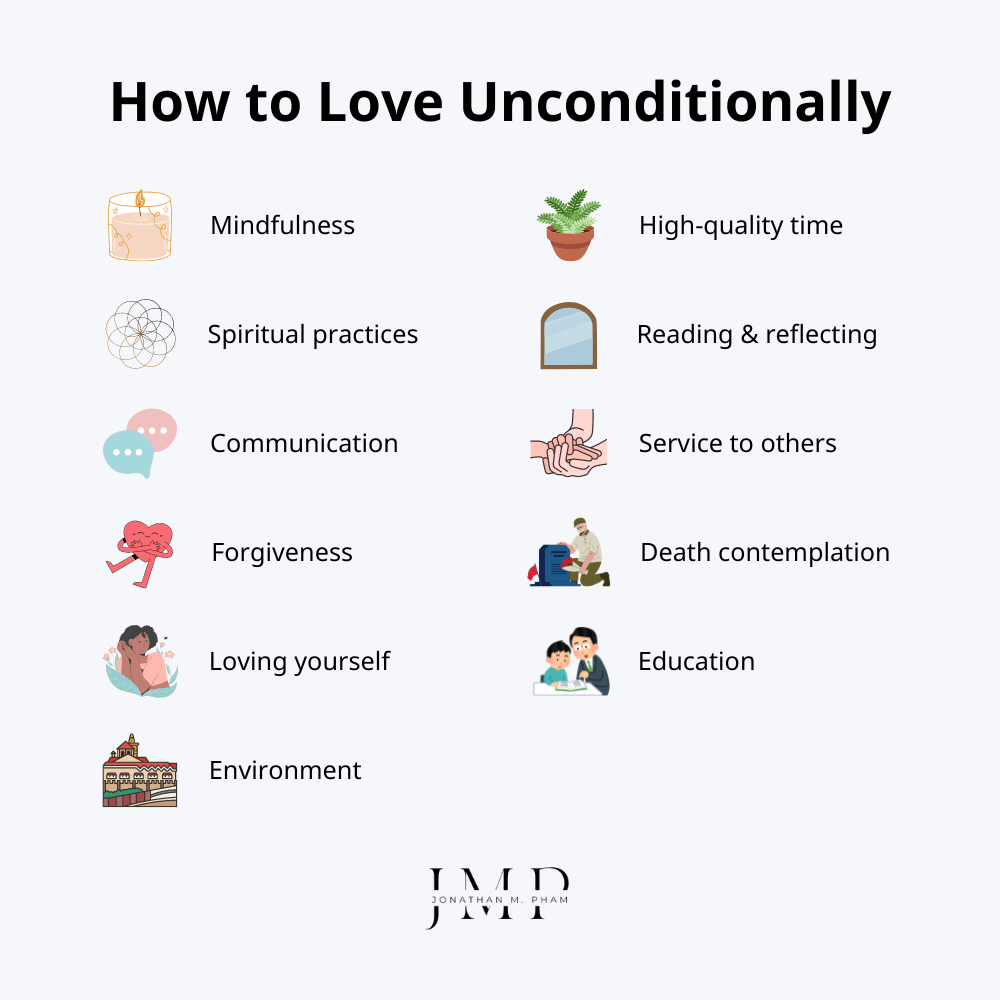
How to love unconditionally
Common Misconceptions about Unconditional Love
Unconditional love is romantic love
While both involve feelings of affection and attachment, they differ in their underlying motivations and characteristics.
- Romantic or erotic love is typically characterized by passion, desire, and exclusivity. It often involves a strong emotional connection and a sense of infatuation. While it can be deeply fulfilling, it is subject to the influence of factors such as physical attraction, shared interests, and societal expectations.
- Unconditional love, on the other hand, is a more selfless and enduring form of love. It is based on a deep sense of care, compassion, and acceptance – a genuine desire for the well-being of another person.
As Sadhguru has pointed out, true love is not about what you or others do, but rather a state of being within yourself. It is a selfless expression of joy and compassion completely within one’s control. Regardless of the circumstances, one is free to choose to love unconditionally or not.
Love is not a relationship, a relationship is a different thing. If you are willing, you can become love, you can make your emotions into a very sweet space.
Sadhguru
Unconditional love does not have boundaries
While it’s true that this type of love is a transcendent one, we should not idealize it and overlook the crucial role of boundaries. In fact, commitments and responsibilities ARE required for love to be unconditional.
Just think about a garden. Even with the most fertile soil and abundant sunlight, careful tending is still necessary. Weeds must be pulled, pests controlled, and water provided at the right times.
Similarly, a relationship cannot be one-sided; it requires boundaries to flourish. These boundaries are not about control or restriction but about creating a healthy, nurturing environment for both parties.
A common misconception is that unconditional love equates to limitless tolerance – which may lead to dangerous situations where one person’s needs are consistently ignored or violated. True love, even unconditional, involves respect and consideration for each other.
For instance, a parent’s love for their child is boundless, but this doesn’t mean they should tolerate harmful behaviors. Setting limits on screen time, enforcing curfews, or discouraging unhealthy habits are all ways of demonstrating love and care. These boundaries are not about punishment – but about guiding the child toward a healthier, happier future.
They are not about control or manipulation – but about maintaining mutual respect, so that the relationship may endure.
Whoever spares the rod hates their children, but the one who loves their children is careful to discipline them.
Proverbs 13:24

Unconditional love does not mean unconditional tolerance
In romantic relationships, boundaries are equally important. It’s okay to express your needs and expectations, even if they may conflict with your partner’s desires. For example, if one feels overwhelmed by constant texting, it’s reasonable to request a break from electronic communication.
Sometimes, it may be better for two people to be separated for a while – not because of hate, but so that both may have the chance to contemplate the experience, learn from it, and renew their bond (which is, indeed, a sign of love).
Human relationships must be based on love – but not a blind or spoiling love. A small good is like a great evil. True love requires that we rigorously seek to discern what is indeed best for others.
Kazuo Inamori
(As a side note, some may argue that for this reason, only the love between one and the Divine can be classified as “unconditional”. That may be understandable, given that humanity is not perfect. But hey, even the Divine has rules for us to follow. Don’t expect to be whoever you are and still end up in Heaven or Nirvana. You reap what you sow, so don’t be abusive :)))
Unconditional love is one without conflict
There are limits to what we can offer others, because as human beings we’re wired to have needs for acceptance, kindness, and intimacy.
John Amodeo
Conflicts are a natural part of any relationship, regardless of the level of love involved. Even the most loving couples will experience disagreements or misunderstandings from time to time. What matters is how these disputes are handled – whether they are resolved with patience, empathy, and a willingness to find common ground or not.
Speaking of which, I think it is a good idea to draw a fine line between two terms: “love” and “like”.
The distinction between them is a nuanced one. Love often involves a deep emotional connection and a sense of care, while liking may be based on admiration or respect.
Hence, it’s possible to love someone without liking their behavior or actions. In such cases, it’s important to communicate openly and honestly about the issues at hand.
Unconditional love is not about avoiding conflict or pretending that everything is perfect. It’s about approaching challenges with compassion and understanding, even when it’s difficult.
What’s more, because unconditional love is boundless, it doesn’t have to be tied to any specific being. Rather, it’s when you become one with the “flow” and let things be regardless of the external conditions. It’s a state of mind that involves no attachment. Even to the one we care for.
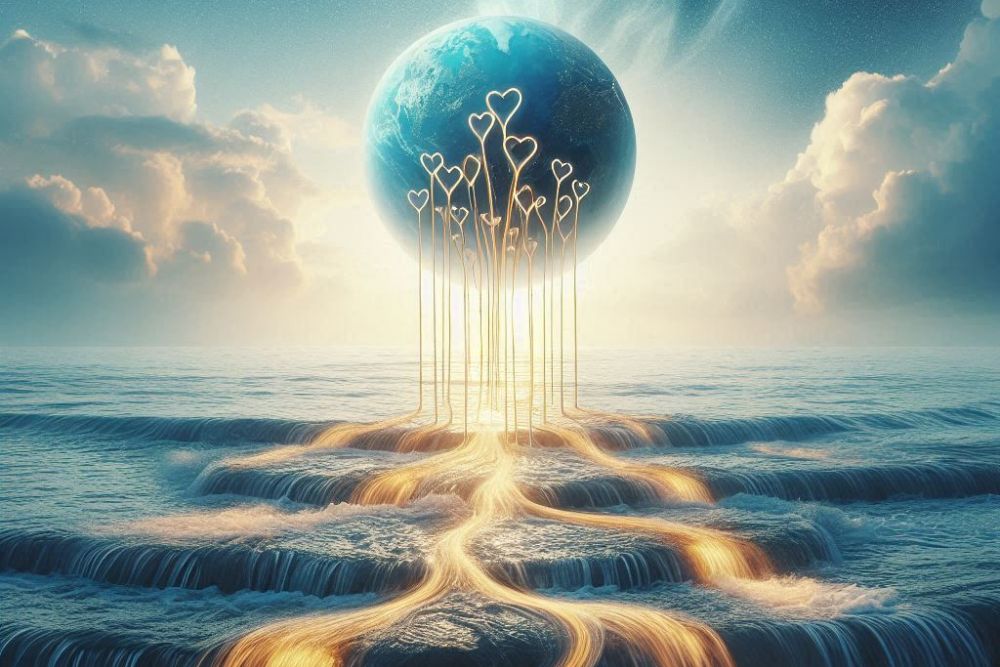
Sometimes, the best way to maintain a state of love is to set boundaries or distance oneself from toxic situations. This doesn’t mean that the love is gone – but rather, one is just trying to protect everyone from harm.
Sometimes, leaving a relationship is actually an act of love, especially when it becomes clear that the tie is harmful. This decision is often made with the intention of seeking a healthier future for both parties.
It’s a complex choice that requires careful consideration and may involve significant emotional pain.
After all, I believe that the most important thing has to do with the intention behind it. Is it because of YOU only or because BOTH OF YOU?
When we leave somebody, is the decision the result of our arrogance and selfishness? Is it an act that truly comes from the heart? Have we already considered every other alternative?
Unconditional love is not painful
Contrary to the popular belief that unconditional love is always blissful, it can be deeply challenging in certain circumstances.
One of the most common sources of pain is unrequited love. When we give someone our love freely and unconditionally, it can be incredibly painful if our feelings are not reciprocated. Even though we continue to love them, the absence of their love in return is capable of causing emotional distress (which, I believe, has to do with the fact that we have NOT been detached from worldly standards yet).
Another issue is experiencing the pain of those we love. When we care deeply about someone, we often feel their pain as our own. This vicarious suffering can be emotionally exhausting, especially when we are unable to alleviate their suffering.
Sometimes, caring for others means that we have to confront and speak up to them – especially if they are resorting to unhealthy behaviors.
It takes a great deal of bravery to stand up to our enemies, but just as much to stand up to our friends.
J. K. Rowling
As excruciating as it may seem, it is precisely in these challenging moments that the true depth and strength of love are revealed.

Challenges of Practicing Unconditional Love
Unrealistic standards
If someone isn’t what others want them to be, the others become angry. Everyone seems to have a clear idea of how other people should lead their lives, but none about his or her own.
Paulo Coelho
One thing I find quite perplexing is the abundance of romantic novels these days, most of which portray love in a way that is far too perfect – as well as the large fanbase of such literary works.
Many of us have a preconceived notion of what love should be. We may envision a fairytale romance, a perfect partner, or a harmonious relationship devoid of conflict. We may believe that true love means never being disappointed or hurt.
However, these idealized versions of love will just turn to disappointment and frustration when reality falls short.
Everyone has flaws and imperfections. True love is often about accepting these flaws and supporting each other through challenges.
Even when we think of loving parents or relatives, there often seem to be unspoken expectations placed upon us. These make it difficult to feel truly loved and appreciated, as we may constantly feel the pressure to meet certain criteria.
Similarly, we may place our own expectations on our loved ones, limiting our ability to love them unconditionally.
Be careful not to fall in love with the fantasy you imagined instead of what’s standing before you.
R. J. Intindola
Recognizing and challenging unrealistic expectations is the first step toward cultivating a healthier understanding of love and life. In certain circumstances, especially for those who have just started embarking on their self-discovery journey, it may be better to remain isolated for a while to strengthen their internal state – until they are ready to be back and shower their family/ community with love.
If for company you cannot find a wise and prudent friend who leads a good life, then, like a king who leaves behind a conquered kingdom, or like a lone elephant in the elephant forest, you should go your way alone. Better it is to live alone; there is no fellowship with a fool. Live alone and do no evil; be carefree like an elephant in the elephant forest.
Dhammapada

Inflated ego
It is easy to acknowledge, but almost impossible to realize for long, that we are mirrors whose brightness, if we are bright, is wholly derived from the sun that shines upon us.
C. S. Lewis
An inflated ego, characterized by excessive self-importance and a sense of entitlement, is a major hindrance to the ability to practice unconditional love. When the ego is at the forefront, one becomes preoccupied with their own desires, needs, and accomplishments; hence, it becomes extremely difficult to put the needs of others before their own. At the same time, these people are inclined to seek constant validation and admiration from others, which makes it truly challenging for them to accept criticism or negative feedback.
Many spiritual and philosophical traditions emphasize the interconnectedness of all beings. In other words, the ego, or the sense of a separate self, is a mere illusion. The pursuit of personal agendas and revenge, often driven by an inflated ego, will ultimately lead to a sense of emptiness and dissatisfaction.
While it may provide a temporary sense of relief or pleasure, it will just perpetuate a cycle of negativity and harm.
Realizing the detrimental effects of an inflated ego is essential for one to cultivate a greater capacity for unconditional love and nurture more meaningful connections with others.
Your task is not to seek for love, but merely to seek and find all the barriers within yourself that you have built against it.
Helen Schucman
Excessive greed
It’s more blessed to give than receive.
Acts 20:35
In today’s materialistic world, far too often, we find ourselves chasing wealth instead of catering to our inner world. Driven by the desire for possessions and fame, we become trapped in a never-ending cycle of dissatisfaction and longing.
Worse, we become inclined to expect rewards or benefits for our actions, even when it comes to acts of kindness or generosity. We give to others not out of altruism, but out of the expectation of rewards – recognition, certification, praise from society, potential for reputation/ new business (which makes our act completely conditional and lose its meaning).
When we give in to greed, feelings of resentment, envy, and distrust are given the room to flourish. As a result, not only are our relationships damaged, but we also experience a loss of perspective and an inability to appreciate the simple joys of life.
Overcoming the desire for more is not an easy feat, and yet it is still possible. Daily gratitude practices, acts of generosity, and mindfulness activities all help “reprogram” the subconscious and therefore counterbalance the effects of greed.
When you give to the needy, do not announce it with trumpets, as the hypocrites do in the synagogues and on the streets, to be honored by others. But when you give to the needy, do not let your left hand know what your right hand is doing, so that your giving may be in secret.
Matthew 6:2-4
Ignorance
Fear is born from our ignorance, from our concepts regarding life, death, being, and nonbeing. If we are able to get rid of all these concepts by touching the reality within ourselves, then nonfear will be there and the greatest relief will become possible.
Thich Nhat Hanh
Ignorance, a concept featured prominently in traditions such as Buddhism (which refers to it as “Avidyā“), refers to one’s lack of knowledge about the world. It causes them to become unable to see things as they truly are, leading to misunderstandings, judgments, and harmful actions.
There are a lot of ways that ignorance manifests in one’s life:
- Preoccupation with material possessions and external appearances.
- Neglecting the importance of cultivating a healthy and compassionate inner life.
- Preference for immediate pleasures over hard work.
- Obsession with career advancement without caring enough for the family.
- Excessive focus on worldly glory without working on one’s heart and mind.
- Prejudices and stereotypes that are based on people’s achievements or backgrounds, rather than their intentions/ potential.
- Feelings of inadequacy, envy, and resentment.
- Constantly comparing oneself to others, especially in an unhealthy way.
- An excessive desire to conform to societal expectations, especially those that are superficial.
- etc.

A commitment to lifelong learning and personal growth provides a solution to combating ignorance and developing a deeper understanding of oneself (as well as the world around them).
Don’t compare your life to others. There’s no comparison between the sun and the moon. They shine when it’s their time.
Buddha
Busyness
We have been moving along at such a fast pace that we no longer know what we are doing. Now we have to wait until our soul catches up with us.
Paulo Coelho
I remember once visiting a barbershop and waiting for my turn to have a haircut. At that time, I was reaching out to the phone in my pocket, when I suddenly noticed one thing.
Everyone in the barbershop, including the guests and the staff, was holding a phone in their hands.
Suddenly, I felt a great sense of shame and decided to stop pulling out my phone; instead, I just sat there silently and waited. After all, there was no need for me to use it – besides the urge to check social media.
It’s so disheartening to see everyone in the shop immersed in their own superficial “world” – instead of talking to each other or just meditating in silence and being mindful of the surroundings. In fact, I believe we see that every day: at work, at home, at school, in the hospital, at the restaurant, on the bus/ train, at church/ temple/ pagoda, etc. everywhere!
In today’s fast-paced, technology-driven world, busyness has become a pervasive issue. When one is constantly preoccupied with work, obligations, and distractions caused by the constant stream of notifications and updates, it becomes mighty hard for them to connect with others on a deep and meaningful level.
What’s worse is that constant busyness makes us more likely to become indifferent to people’s needs and feelings. Instead of spending time with our loved ones, we prefer staying at work to chase our personal agendas, instead of catering to what truly matters to us. With the rise of social media platforms (which allow people to become “famous” on their own terms without the need for hard work), many become preoccupied with building their online image and social status; hence, they acquire an inflated sense of self as a result.
Setting clear boundaries between work and personal time is one way to avoid feeling overwhelmed and stressed. We should remind ourselves to take regular breaks from technology to reconnect with ourselves and others.
Indifference and neglect often do much more damage than outright dislike.
J. K. Rowling
A political, divisive mindset
In the sky, there is no distinction of east and west; people create distinctions out of their own minds and then believe them to be true.
Buddha
I cannot recall a time in my life when there were so many conflicts and political divisions all occurring at the same time – as it is happening right now. The Russian-Ukraine war, the escalating conflicts in the Middle East, the rising tensions in East Asia, the US 2024 election (where people seem to enjoy pointing fingers at each other rather than presenting a solution to move forward), etc. the list just goes on and on.
No wonder why people these days find it truly challenging to embrace the concept of unconditional love.
Polarized thinking and partisan loyalty cause us to become caught up in divisions. As a result, we cannot see others as individuals and instead view them through a lens of political affiliation. The sense of tribalism that stems from such divisions prompts us to view others (especially those who do not belong to our “groups”) with suspicion or hostility.
Not to mention, many people engage in politics to advance their own interests or those of their social or economic group – rather than for the greater good.
However, I believe that it is in this chaotic period that the message of love – a boundless one – is more critical than ever.
Despite political differences, we all share many common experiences and aspirations. Recognizing the underlying humanity of all people is essential for fostering understanding and compassion.
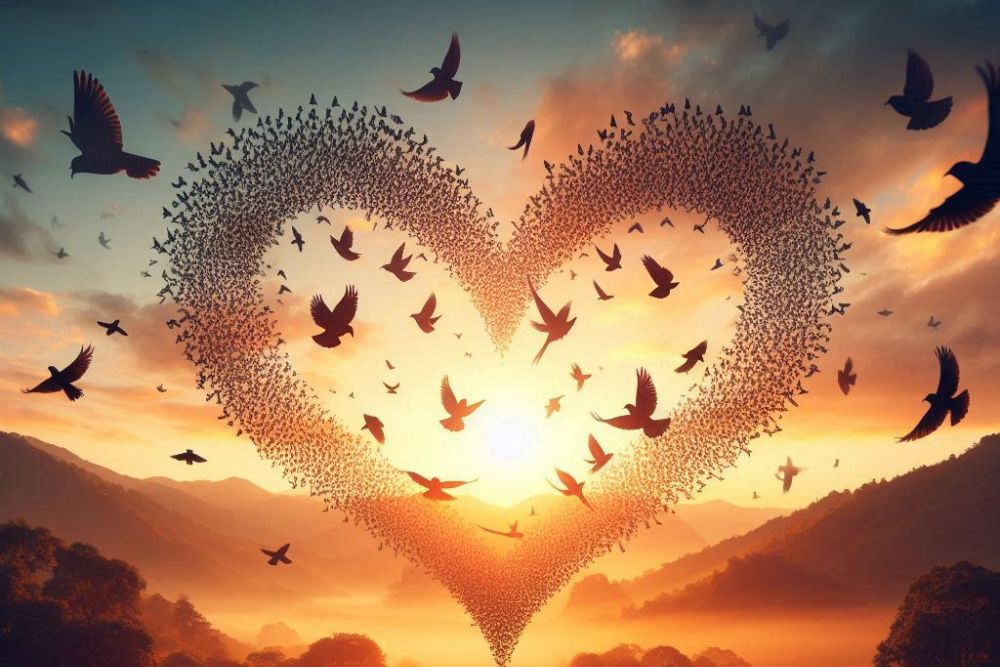
While it may seem ambitious to discuss things like war and social justice, I believe we can all contribute with the simplest daily acts. For example, have you ever found yourself engaging in meaningless quarrels with a colleague – just because of a trivial difference in your working styles?
Have you ever argued with your spouse – just because their culinary preferences are not the same as yours?
Have you ever distrusted another person – just because of their dress code/ accent/ religion, etc.?
The cultivation of unconditional love doesn’t have to involve something marvelous. Just do your best to engage in constructive dialogues and work toward common goals in the workplace/ at home – that should suffice and help create a more inclusive and equitable society.
Differences of habit and language are nothing at all if our aims are identical and our hearts are open.
J. K. Rowling
Who & When Should I Show Unconditional Love to?
Again, my answer is: It depends. It’s up to you to decide.
After all, it’s a personal journey that is greatly influenced by one’s unique circumstances and values. The most important thing is to listen to your heart and intuition. Ask yourself:
- Do I genuinely care for this person without expecting anything in return? (making sure that no sense of self is involved)
- Is my desire to love them free from everything, or is it rooted in self-interest or societal pressures?
- Do I truly care for someone, or is my act just to make myself look better?
- Do I make donations out of altruism, or is it because I don’t want people to bad-mouth me?
- When I commit an act of generosity, do I feel coerced to do it? Am I afraid that failing to do so will not meet a certain level of social ethics?
- Can I love them even when they’re difficult or make mistakes?
Additional questions to consider:
- Who do I naturally feel drawn to? Are there certain individuals who evoke feelings of warmth, empathy, and a desire to support them unconditionally?
- When do I find myself offering unconditional love without hesitation? Is it in moments of crisis, joy, or simply in everyday interactions?
- What are my motivations for extending love? Are they purely altruistic, or do other factors play a role, such as fear of rejection, a need for control, or a desire for social approval?
Examples to ponder:
- Family: Do I feel a deep connection to my family members and a desire to love them unconditionally, regardless of their actions or mistakes?
- Friends: Are there friends who I have a strong bond with/ consistently support and care for, even when they may disappoint me?
- Community: Do I feel a sense of responsibility toward the community and a desire to help others, regardless of their background or circumstances?
- Strangers: Have I ever found myself offering kindness to a stranger, perhaps in a moment of need or vulnerability?
Read more: 50 Spiritual Questions for Awakening the Soul

Remember, unconditional love is a personal journey. It’s about discovering who you are, what truly matters to you, and how you want to express your love and compassion in the world.
While this type of love may seem like an unattainable ideal, it is a worthy goal to strive for.
The choice to love unconditionally is ultimately up to us. If we let expectations, judgments, or resentments come in, even parental love may become transactional. (though I myself – at least as an East Asian – believe most are not)
As the saying goes, “You reap what you sow.” By choosing to love unconditionally, we reap the rewards of inner peace, fulfillment, and harmonious relationships. Conversely, choosing to hold onto resentment, judgment, and expectations will only give rise to suffering and isolation.
It’s not about loving everyone under every circumstance (e.g. who would do that to someone like Hitler or Pol Pot?), but about cultivating a more compassionate and forgiving attitude toward those in our lives.
As challenging as it may seem, I highly recommend that you try to practice this type of love more and more every day, especially with those in your family, your “tribes”, and eventually, the community.
A jug fills drop by drop.
Buddha
I am not claiming to have mastered unconditional love. It is a journey that requires constant effort and self-reflection (I myself have stumbled from time to time and committed many foolish mistakes). In fact, even the most spiritually evolved individuals may struggle with moments of judgment or resentment.
However, even small steps can make a significant difference in our lives and the lives of those around us.
While it’s important to exercise discernment and not extend love freely to those who may exploit it, striving for this ideal can enrich your life and foster stronger, more meaningful connections with others.
The rest is up to you. Would you prefer to drink poisons or antidotes? Your choice.
Love anything and your heart will be wrung and possibly broken. If you want to make sure of keeping it intact you must give it to no one, not even an animal. Wrap it carefully round with hobbies and little luxuries; avoid all entanglements. Lock it up safe in the casket or coffin of your selfishness. But in that casket, safe, dark, motionless, airless, it will change. It will not be broken; it will become unbreakable, impenetrable, irredeemable. To love is to be vulnerable.
C. S. Lewis
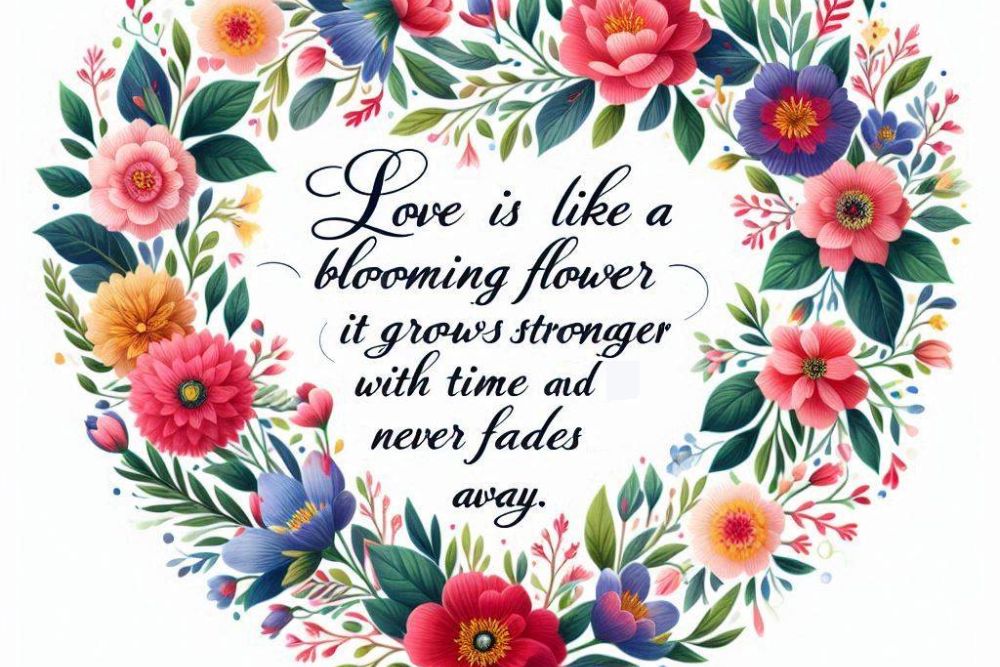
Words of unconditional love
Unconditional Love Quotes
More quotes can be found here.
Intense love does not measure, it just gives.
Mother Teresa
Love has nothing to do with what you are expecting to get – only with what you are expecting to give – which is everything.
Katharine Hepburn
The greatest gift that you can give to others is the gift of unconditional love and acceptance.
Brian Tracy
If love is blind, then maybe a blind person that loves has a greater understanding of it.
Criss Jami
The hardest thing in the world for a human to accept is pure, unconditional, true love and acceptance. We’re conditioned to believe that love and acceptance have to be earned in some way.
Fredrica
Until we have seen someone’s darkness we don’t really know who they are. Until we have forgiven someone’s darkness, we don’t really know what love is.
Marianne Williamson
People are just as wonderful as sunsets if you let them be. When I look at a sunset, I don’t find myself saying, “Soften the orange a bit on the right hand corner.” I don’t try to control a sunset. I watch with awe as it unfolds.
Carl Rogers
You don’t expect trees to change, you love them as they are.
Isabel Allende
The only way of knowing a person is to love them without hope.
Walter Benjamin
Love must be as much a light as it is a flame.
Henry David Thoreau
The love we give away is the only love we keep.
Elbert Hubbard
Life without love is like a tree without blossoms or fruit.
Khalil Gibran
True Friendship is the least jealous of loves. Two friends delight to be joined by a third, and three by a fourth, if only the newcomer is qualified to become a real friend. They can then say, as the blessed souls say in Dante, “Here comes one who will augment our loves.” For in this love, to divide is not to take away.
C. S. Lewis
Deeds will not be less valiant because they are unpraised.
J. R. R. Tolkien
Do not pity the dead. Pity the living, and, above all those who live without love.
J. K. Rowling
Love, as powerful as your mother’s for you, leaves its own mark. Not a scar, no visible sign… to have been loved so deeply, even though the person who loved us is gone, will give us some protection forever.
J. K. Rowling
You think the dead we loved ever truly leave us? You think that we don’t recall them more clearly than ever in times of great trouble?
J. K. Rowling
Certain things in life simply have to be experienced and never explained. Love is such a thing.
Paulo Coelho
You are together because a forest is always stronger than a solitary tree. The forest conserves humidity, resists the hurricane, and helps the soil to be fertile. But what makes a tree strong is its roots. And the roots of a plant cannot help another plant to grow. To be joined together in the same purpose is to allow each person to grow in his own fashion.
Paulo Coelho
We are travelers on a cosmic journey, stardust, swirling and dancing in the eddies and whirlpools of infinity. Life is eternal. We have stopped for a moment to encounter each other, to meet, to love, to share. This is a precious moment. It is a little parenthesis in eternity.
Paulo Coelho
If you stumble about believability, what are you living for? Love is hard to believe, ask any lover. Life is hard to believe, ask any scientist. God is hard to believe, ask any believer. What is your problem with hard-to-believe?
Yann Martel, Life of Pi
If you want happiness for a lifetime, help somebody else.
Chinese Proverbs
Hope and fear are both phantoms that arise from thinking of the self. When we don’t see the self as self, what do we have to fear?
Lao Tzu
If a person seems wicked, do not cast him away. Awaken him with your words, elevate him with your deeds, repay his injury with your kindness. Do not cast him away; cast away his wickedness.
Lao Tzu
Everything begins and ends with love and thanks. Wouldn’t it be wonderful to live each day with the beauty of this crystal within your heart?
Masaru Emoto
When I used to perform weddings, the image I always had was the image of a triangle, in which there are two partners and then there is this third force, this third being, that emerges out of the interaction of these two. The third one is the one that is the shared awareness that lies behind the two of them.
Ram Dass
For most people, love means, ‘You must do what I want.’ No, love means, they can do what they want, and we still love them.
Sadhguru
To give pleasure to a single heart by a single act is better than a thousand heads bowing in prayer.
Mahatma Gandhi
You must not lose faith in humanity. Humanity is like an ocean; if a few drops of the ocean are dirty, the ocean does not become dirty.
Mahatma Gandhi
My religion is very simple. My religion is kindness.
Dalai Lama
Love and compassion are necessities, not luxuries. Without them, humanity cannot survive.
Dalai Lama
There is more hunger for love and appreciation in this world than for bread.
Mother Teresa
If our love is only a will to possess, it is not love.
Thich Nhat Hanh
Love is like a friendship caught on fire. In the beginning, a flame, very pretty, often hot and fierce, but still only light and flickering. As love grows older, our hearts mature and our love becomes as coals, deep-burning and unquenchable.
Bruce Lee
If you want to change another person, first change your own heart. When you change, others around you will change.
Daisaku Ikeda
To the extent that we love others, we will be loved. To the extent that we work for others’ happiness, we will enjoy protection and support. This is the law of cause and effect.
Daisaku Ikeda
Happiness comes when your work and words are of benefit to others.
Buddha
In the end, only three things matter: how much you loved, how gently you lived, and how gracefully you let go of things not meant for you.
Buddha
However many holy words you read, however many you speak, what good will they do you if you do not act on them?
Buddha
A man is not called wise because he talks and talks again; but if he is peaceful, loving and fearless then he is in truth called wise.
Buddha
Whoever wants to become great among you must be your servant, and whoever wants to be first must be slave of all.
Mark 10:43-44
The coming of the kingdom of God is not something that can be observed, nor will people say, ‘Here it is,’ or ‘There it is,’ because the kingdom of God is in your midst.
Luke 17:20-21
And now these three remain: faith, hope and love. But the greatest of these is love.
1 Corinthians 13:13
By this everyone will know that you are my disciples, if you love one another.
John 13:35
Love your enemies and pray for those who persecute you.
Matthew 5:44
If anyone slaps you on the right cheek, turn to them the other cheek also. And if anyone wants to sue you and take your shirt, hand over your coat as well. If anyone forces you to go one mile, go with them two miles. Give to the one who asks you, and do not turn away from the one who wants to borrow from you.
Sermon on the Mount, Matthew 5:39-42
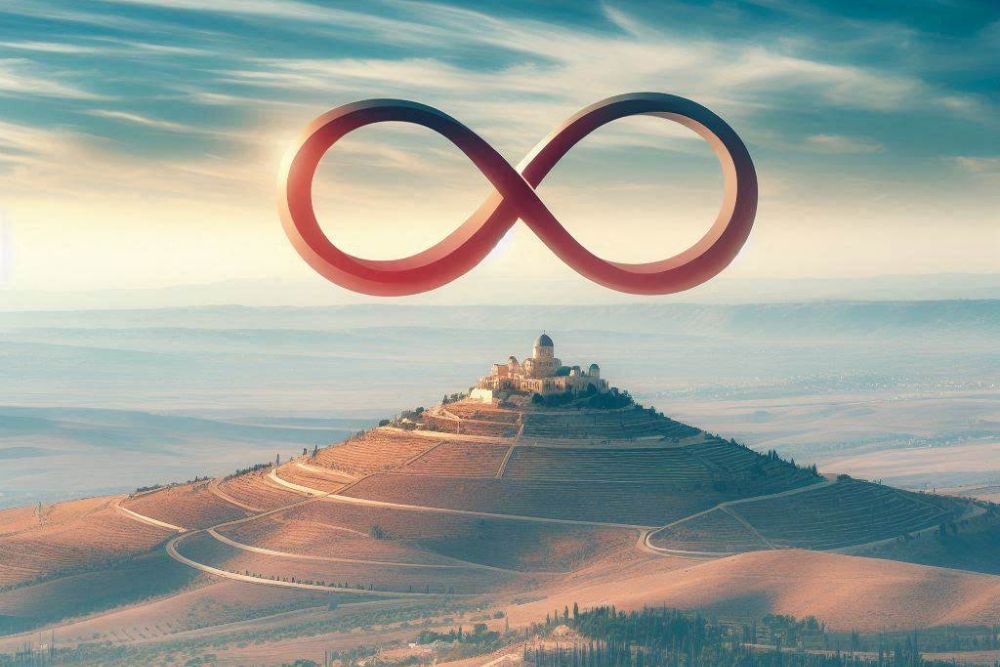
Final Thoughts
I believe that unarmed truth and unconditional love will have the final word in reality. This is why right, temporarily defeated, is stronger than evil triumphant.
Martin Luther King Jr.
Unconditional love, a concept that has captivated philosophers, poets, and spiritual seekers for centuries, offers a beacon of hope in a world often characterized by division and judgment. It’s a love that goes beyond the surface – one that is steadfast, forgiving, and enduring.
It’s a reminder that we are all interconnected, and our actions have the potential to make a difference; hence, we should strive to embrace our own imperfections and those of others – as well as to let go of things and forgive freely.
When we extend compassion without reservation, we create a ripple effect that positively impacts the entire community. While it may not solve all of life’s problems, it will certainly enrich our experiences and make the world a more compassionate place.
As you learn to love people without reservation, without the fear of loss or the expectation of reciprocity, your life will gradually turn to a much brighter page!
There’s a place for us
Somewhere a place for us
Peace and quiet and open air
Wait for us
SomewhereThere’s a time for us
Someday a time for us
Time together with time to spare
Time to look, time to care
Someday!Somewhere
We’ll find a new way of livingWe’ll find a way of forgiving
Somewhere“Somewhere” song
Other resources you might be interested in:
- Law of Attraction: Tips for Manifesting Abundance in Life
- Ikigai (生き甲斐): The Blueprint for a Purposeful & Abundant Life
- Winning at All Costs: Pitfall on the Path to Fulfillment
- 14 Incredible Benefits of Classical Music in Life
- 18 Best Spiritual Films: Awaken, Inspire, and Enlighten
Let’s Tread the Path Together, Shall We?

